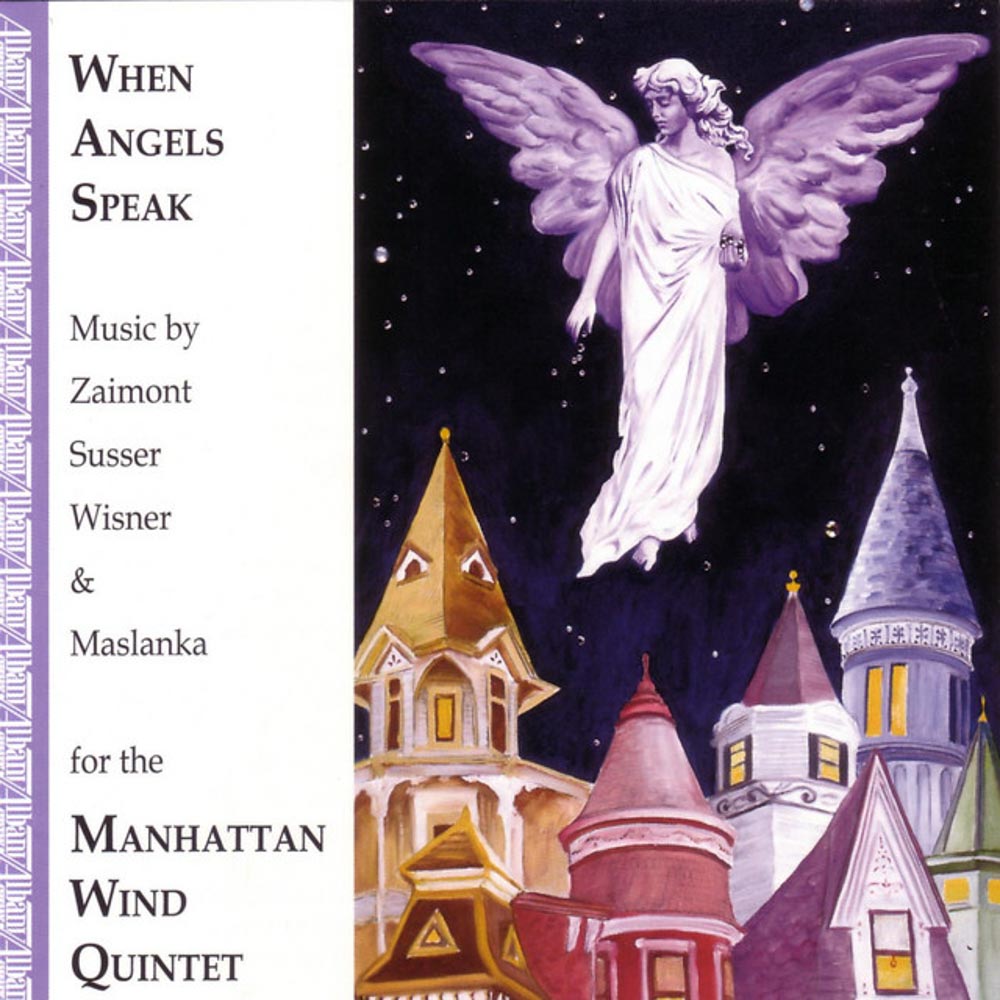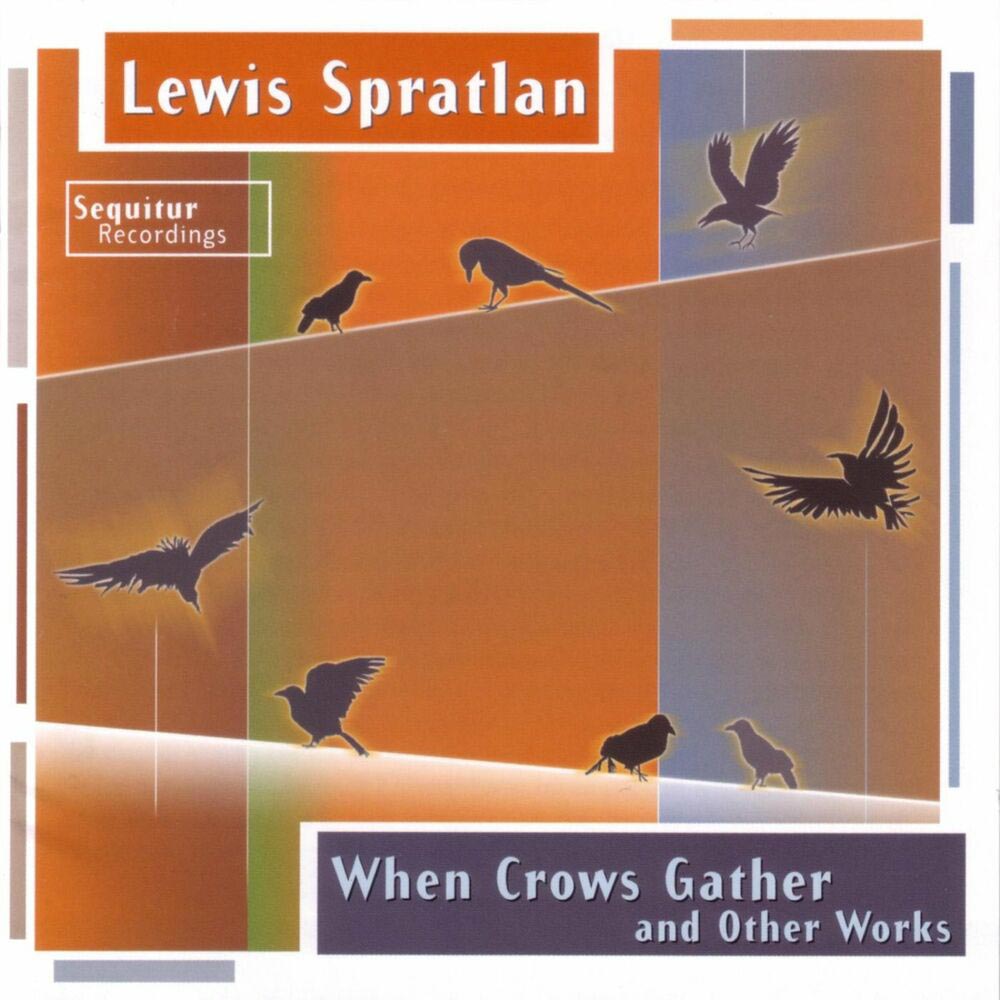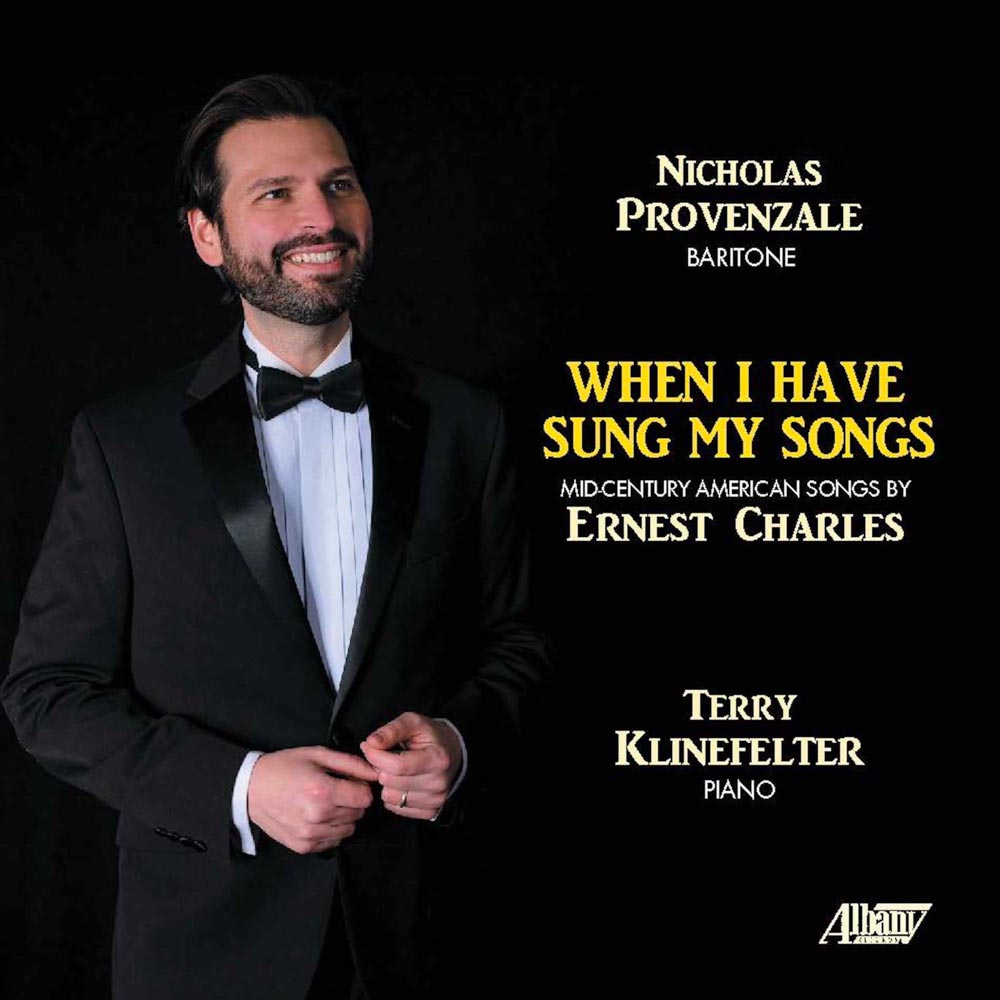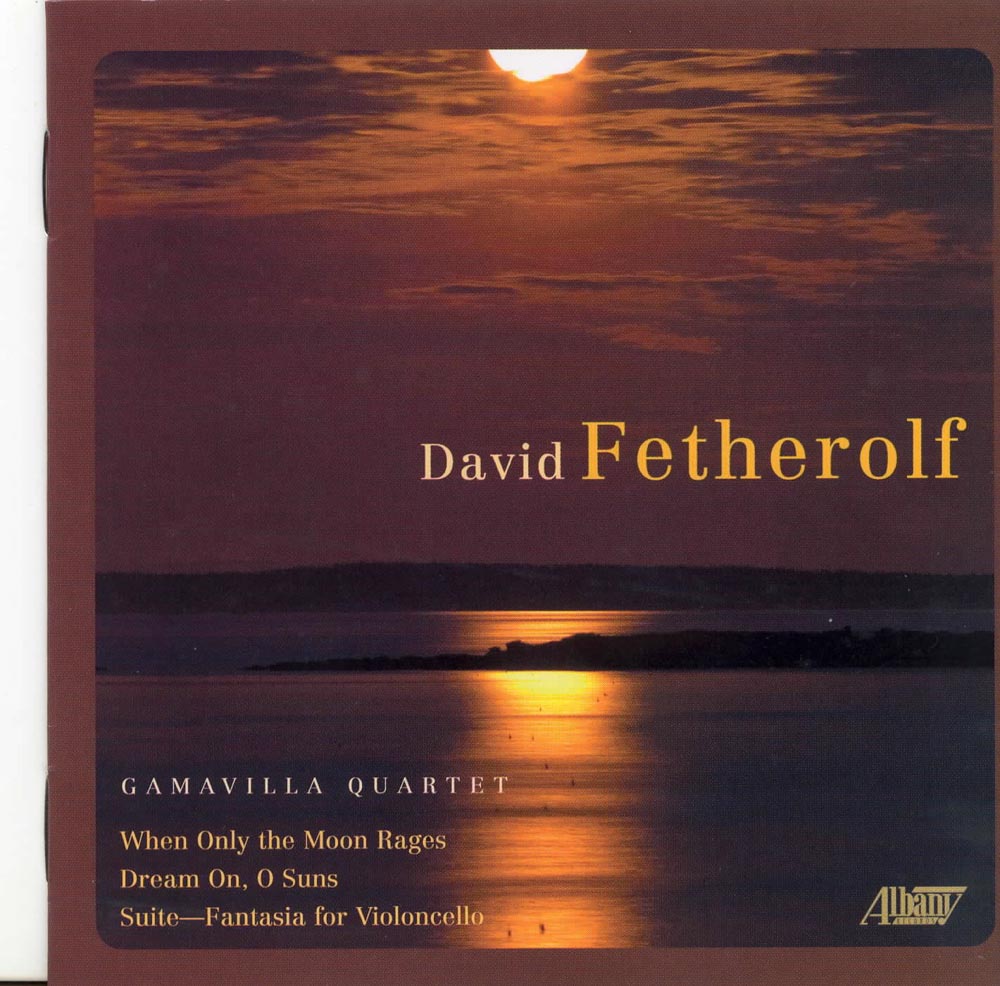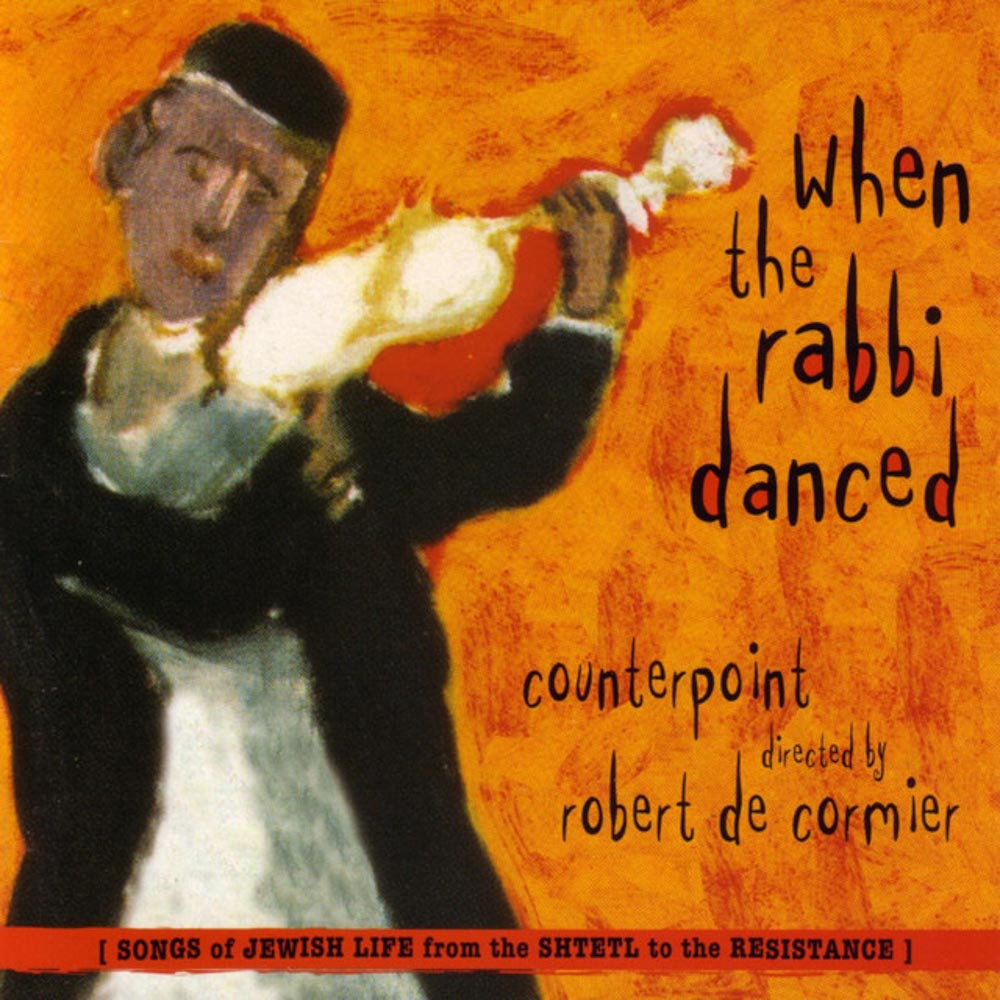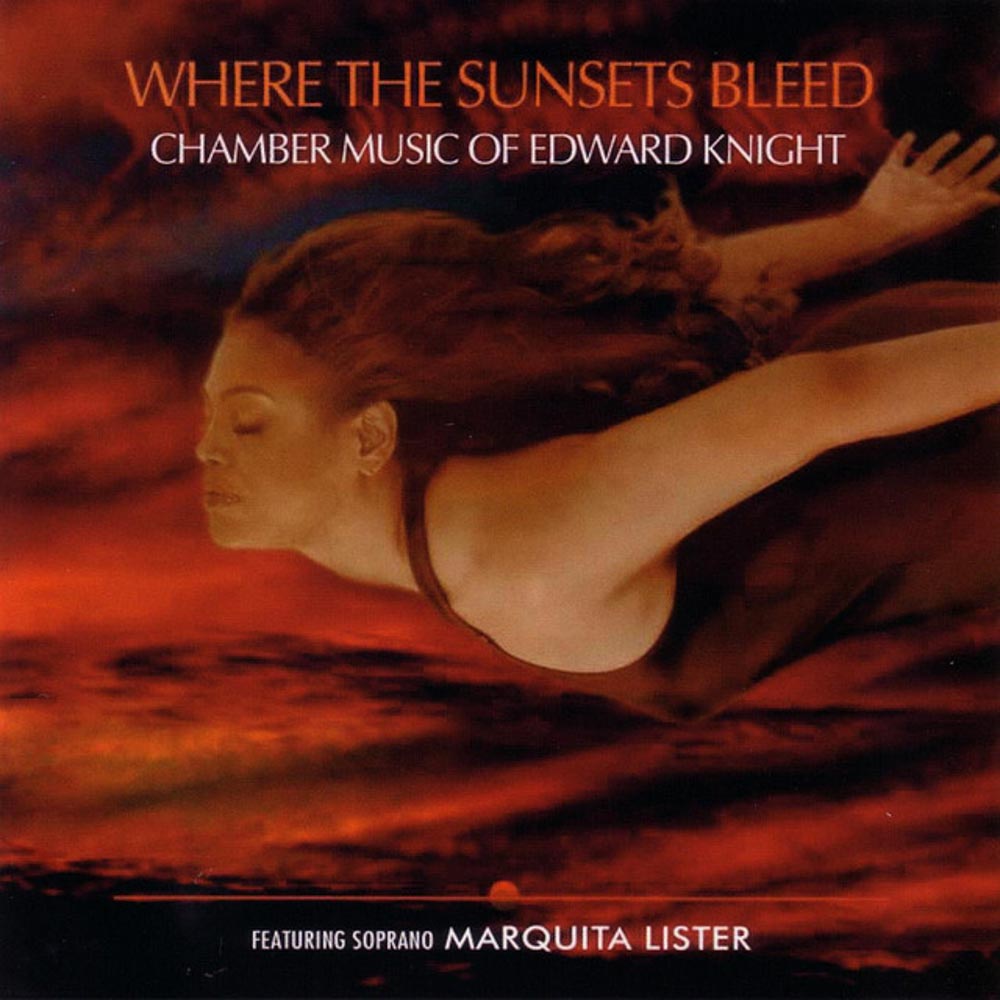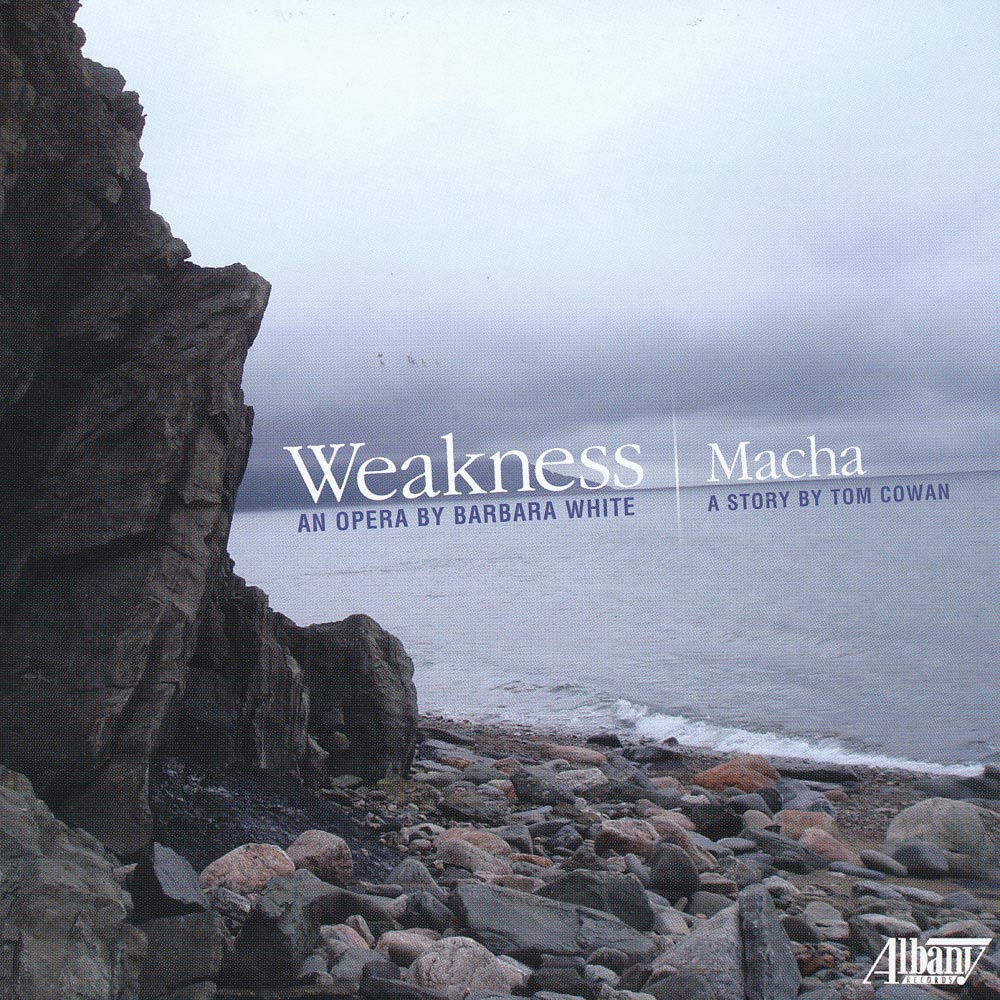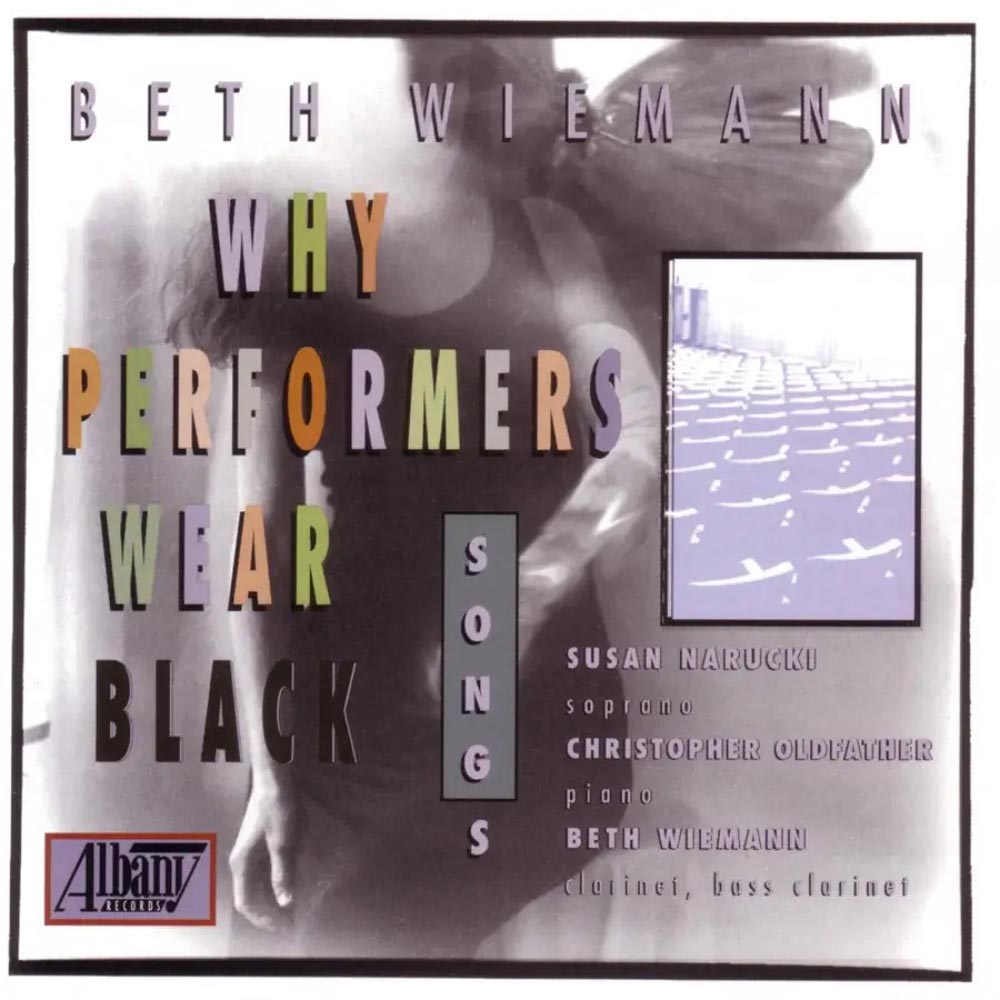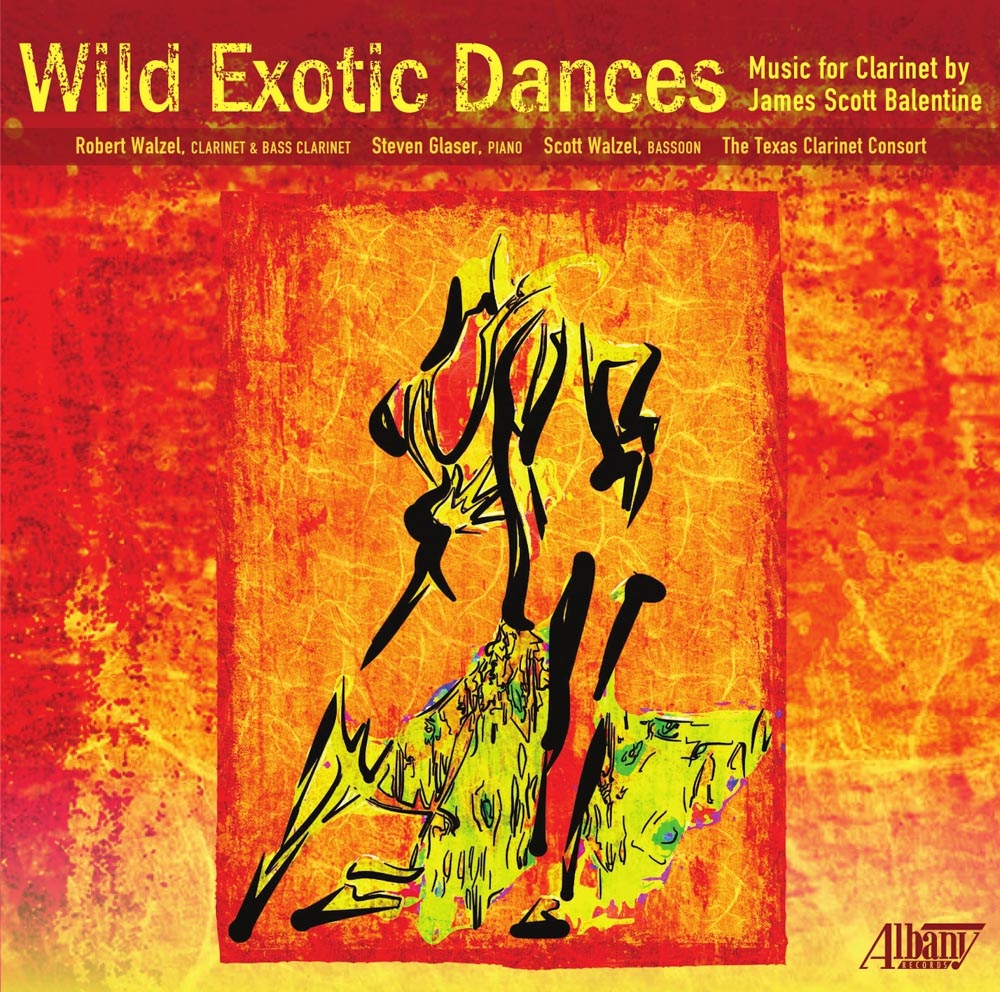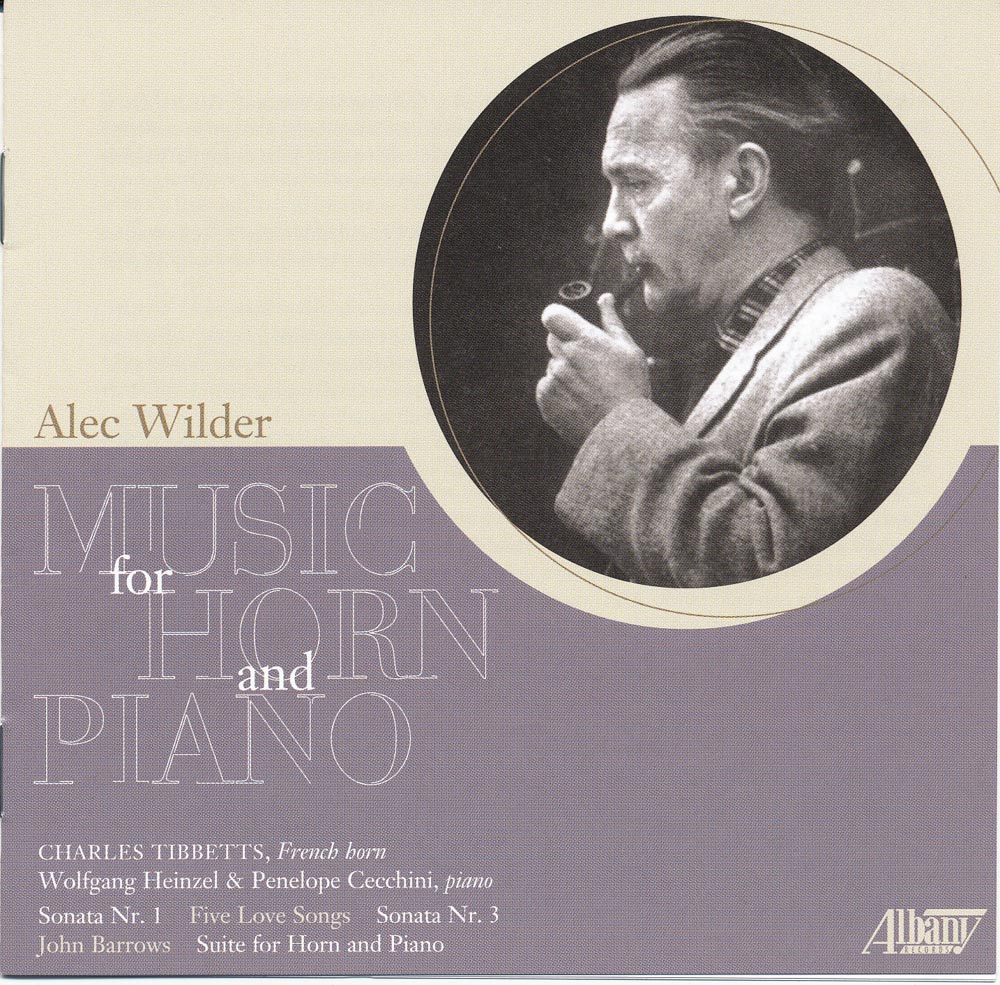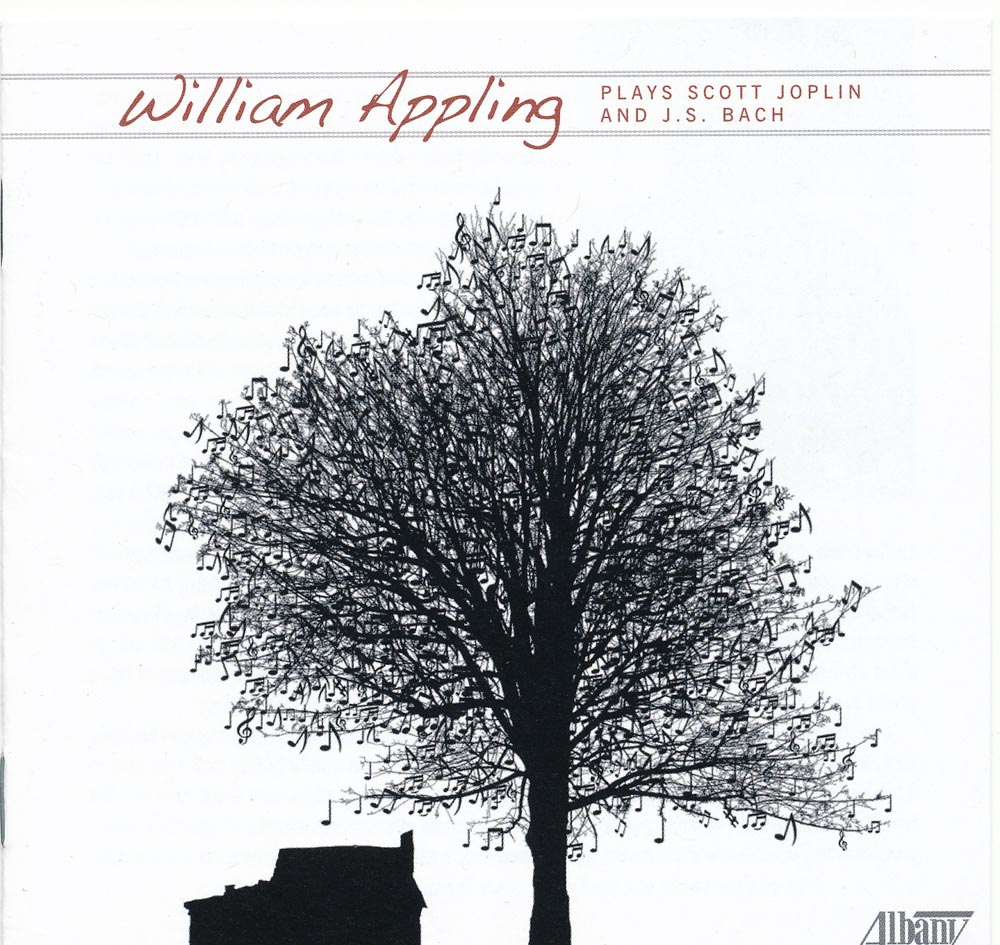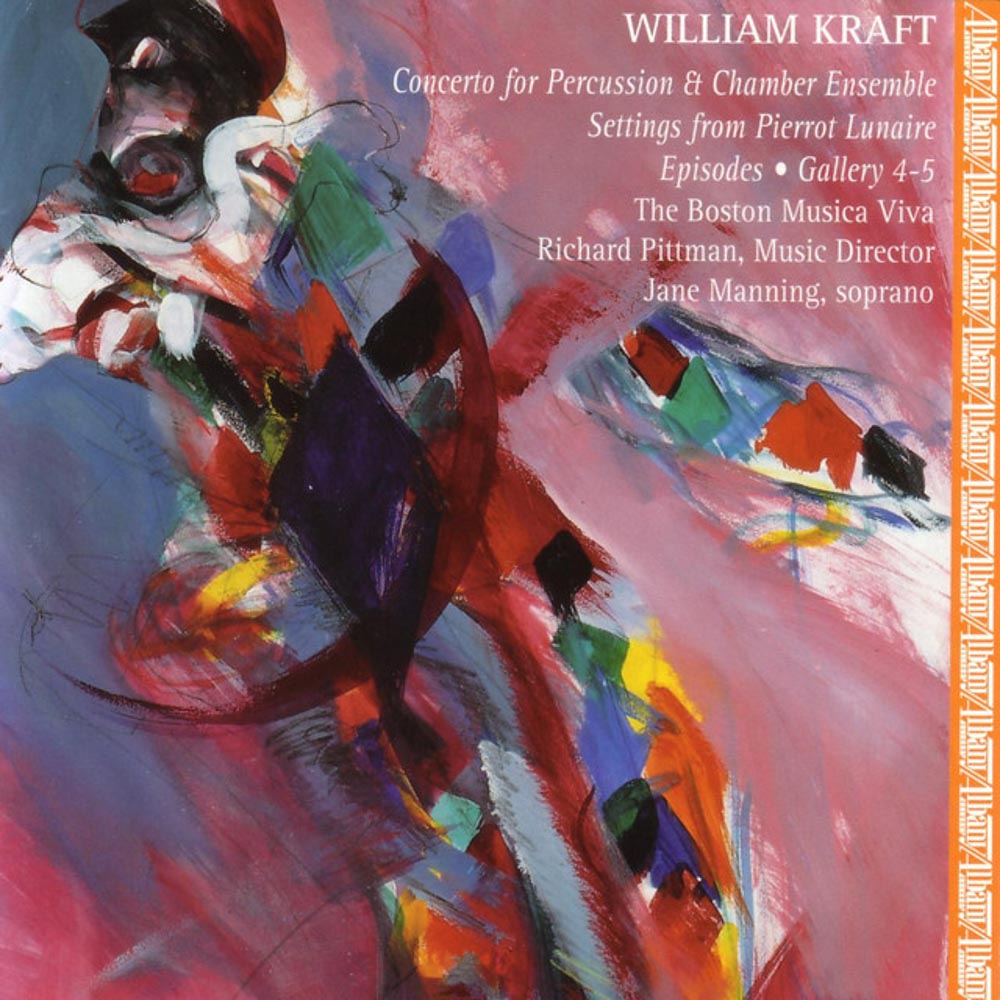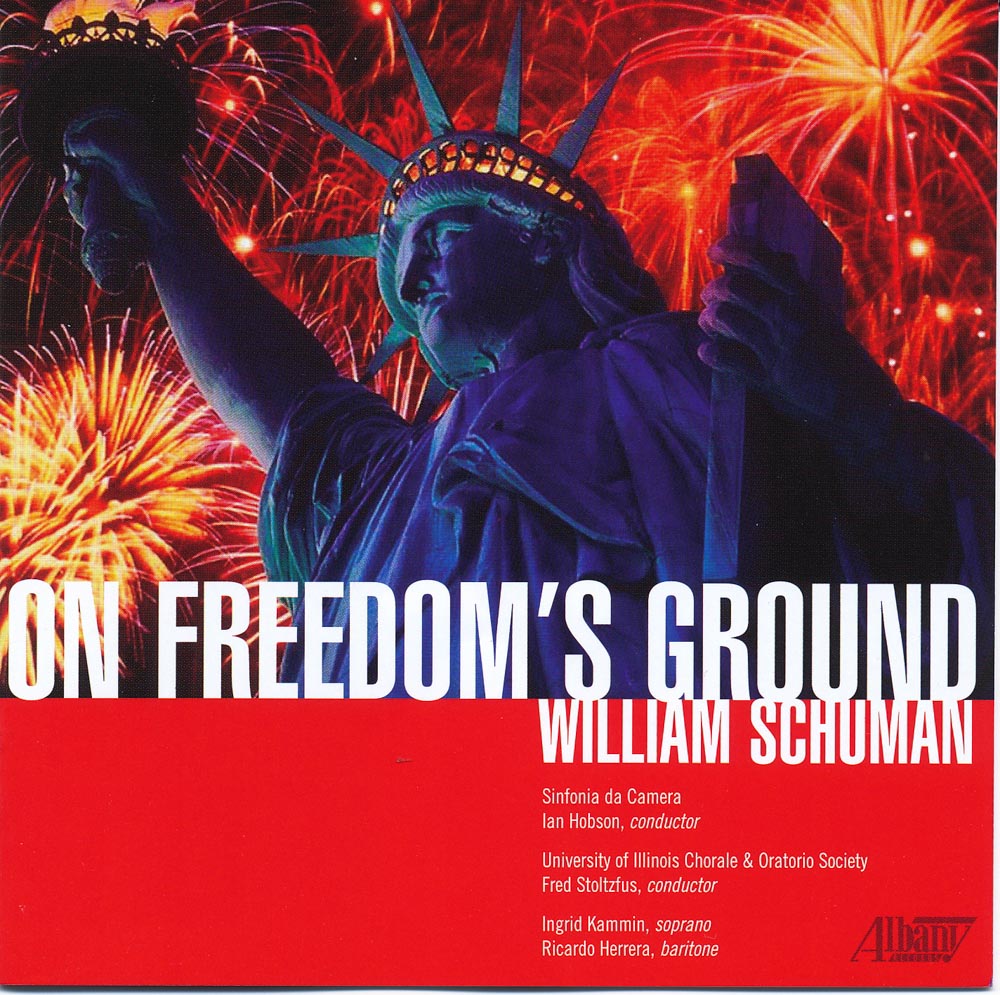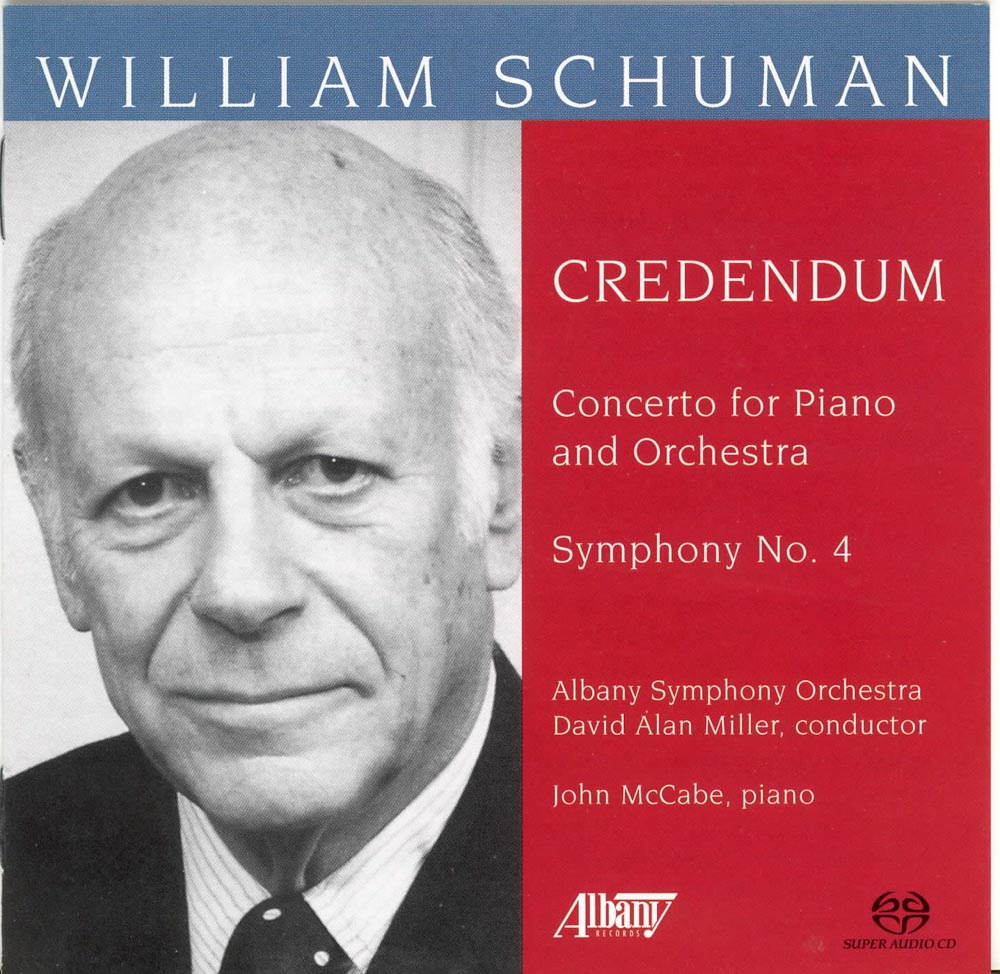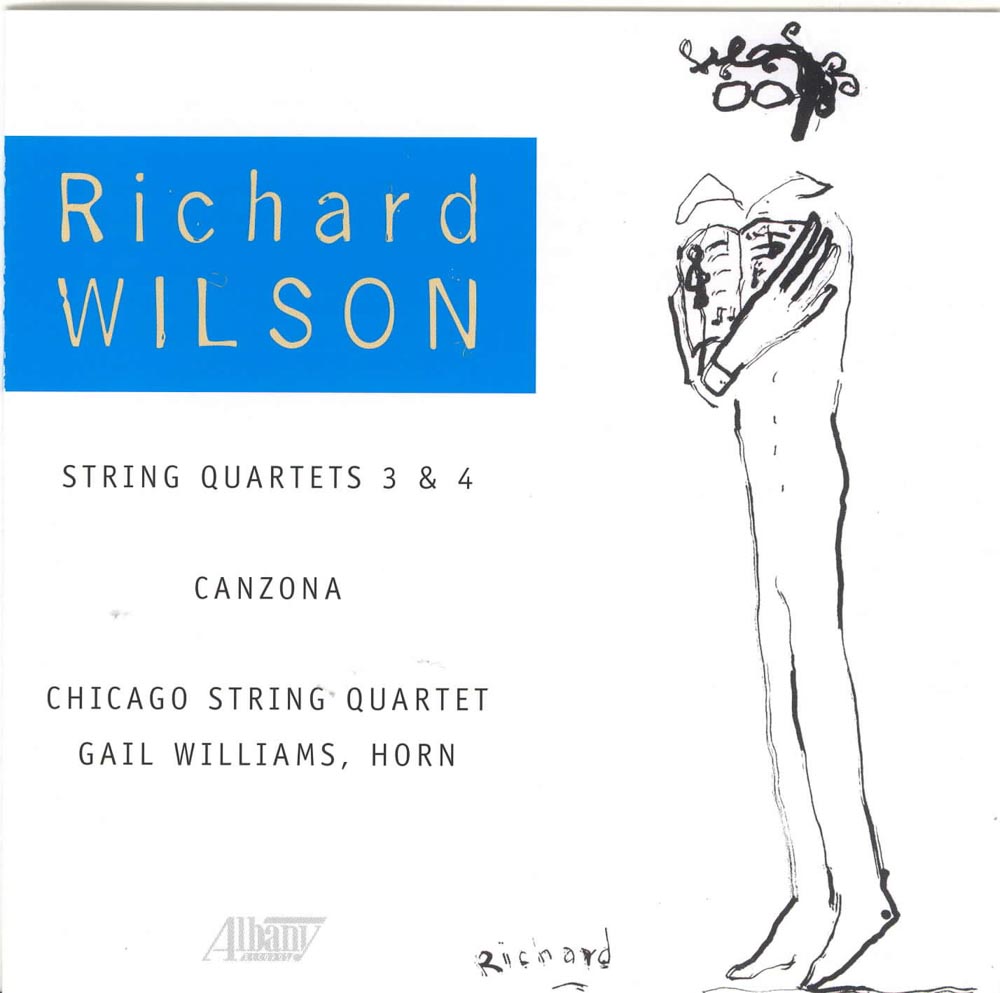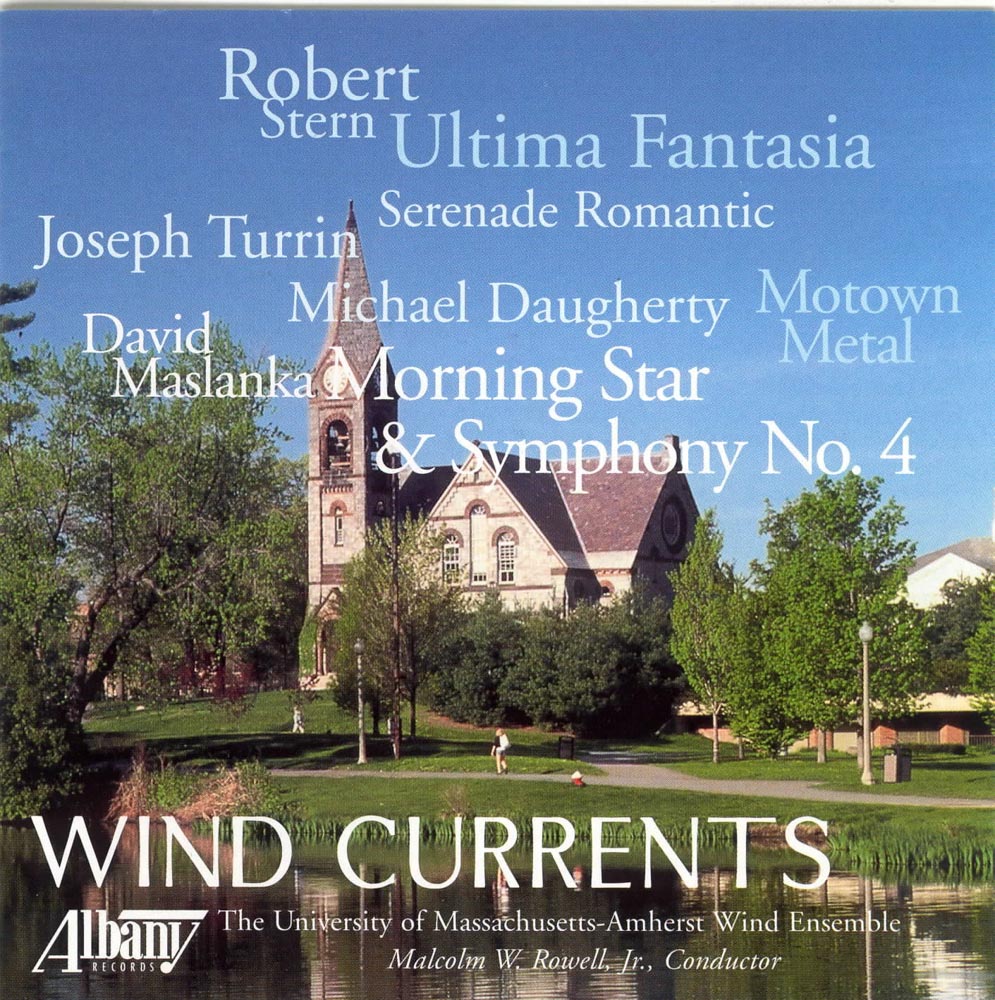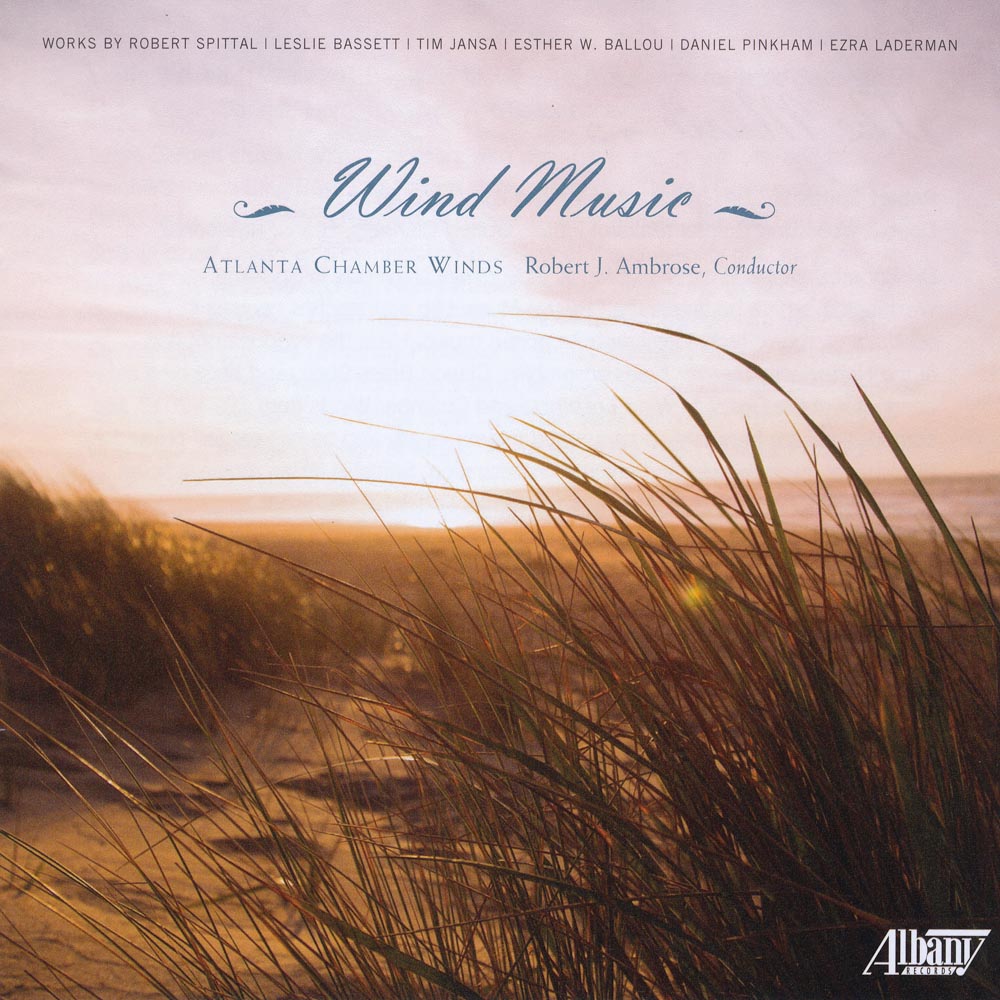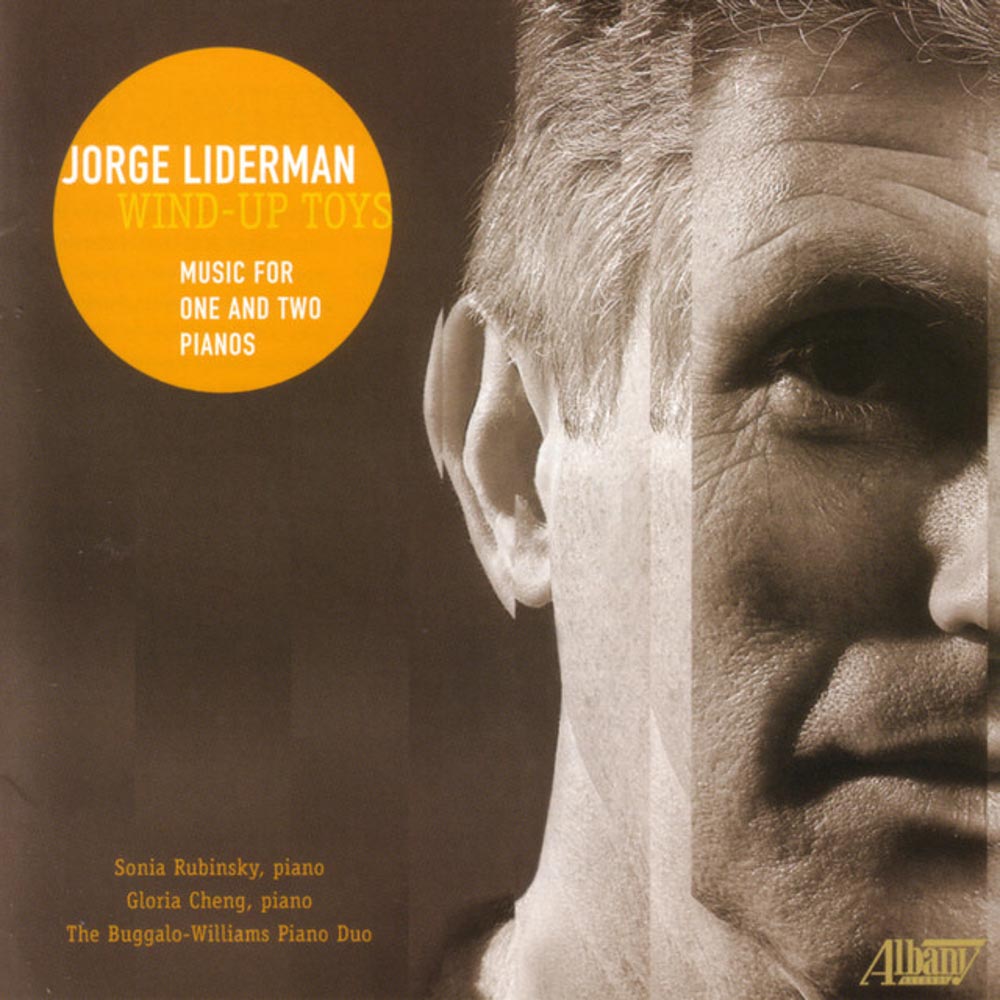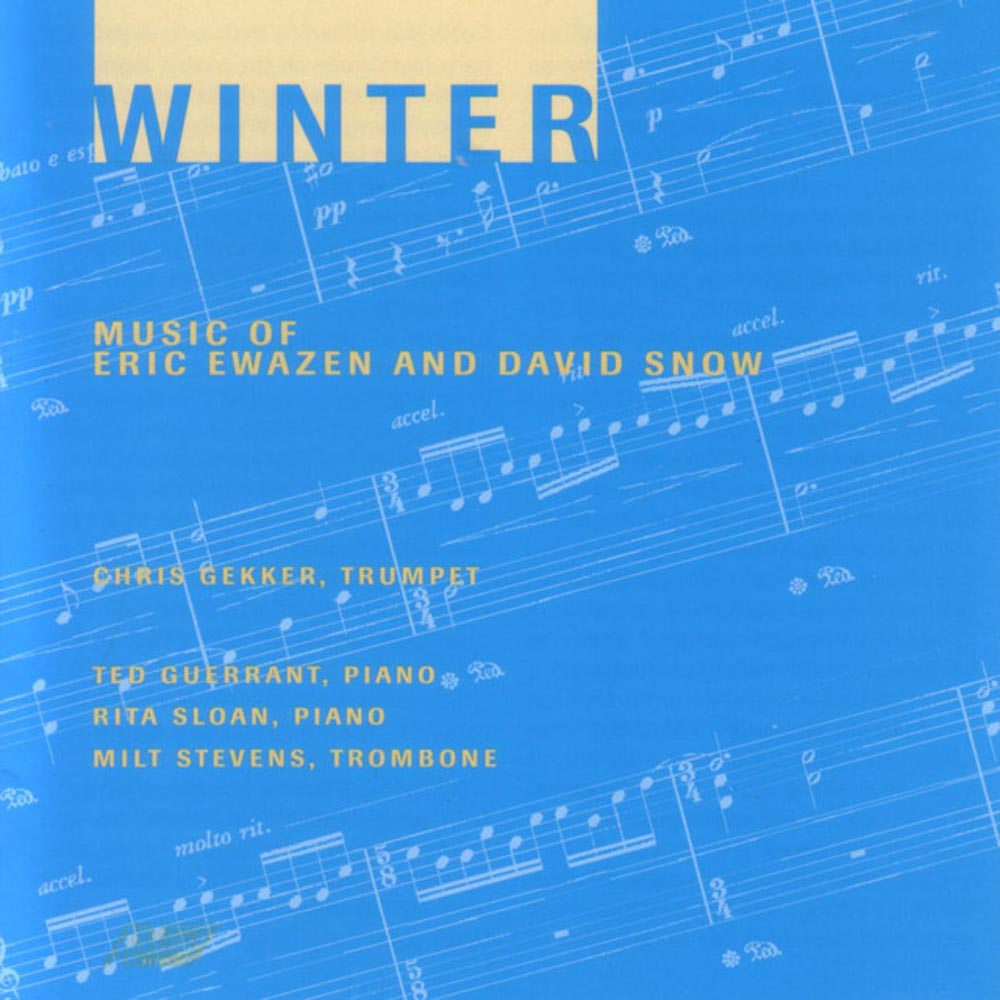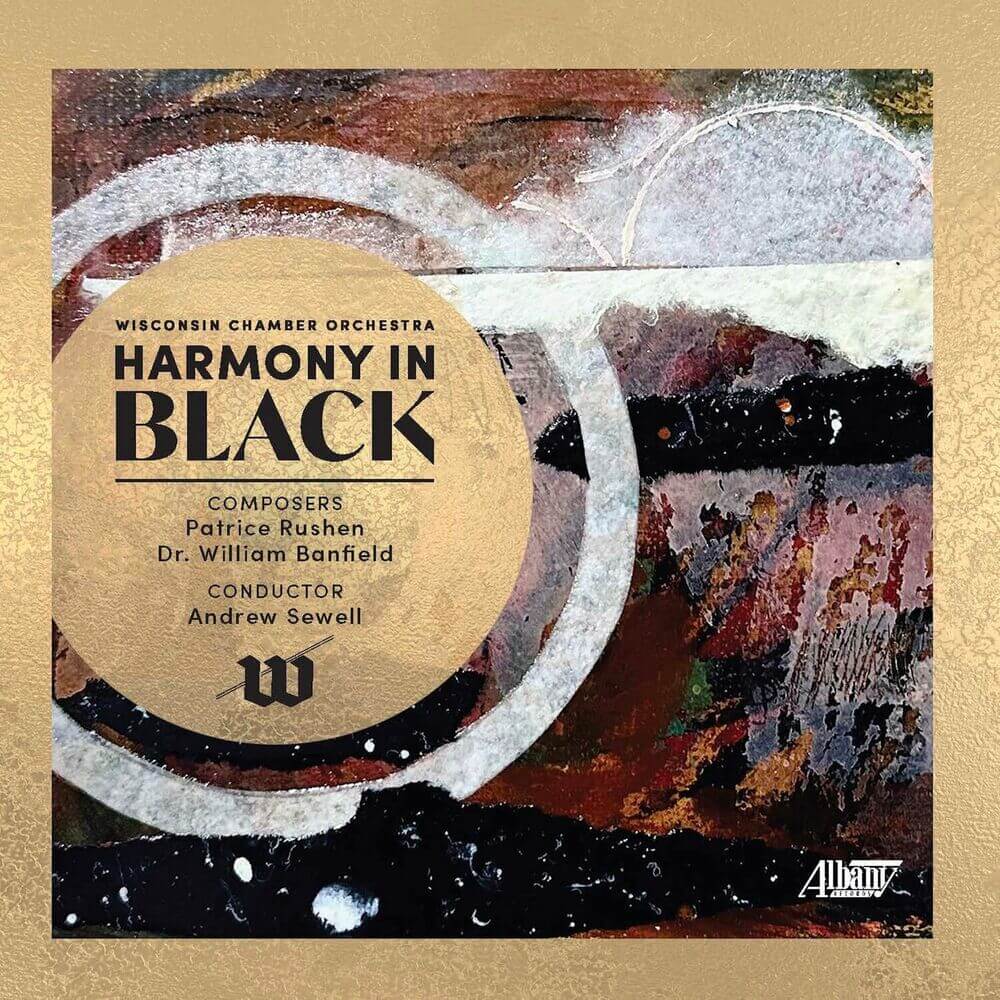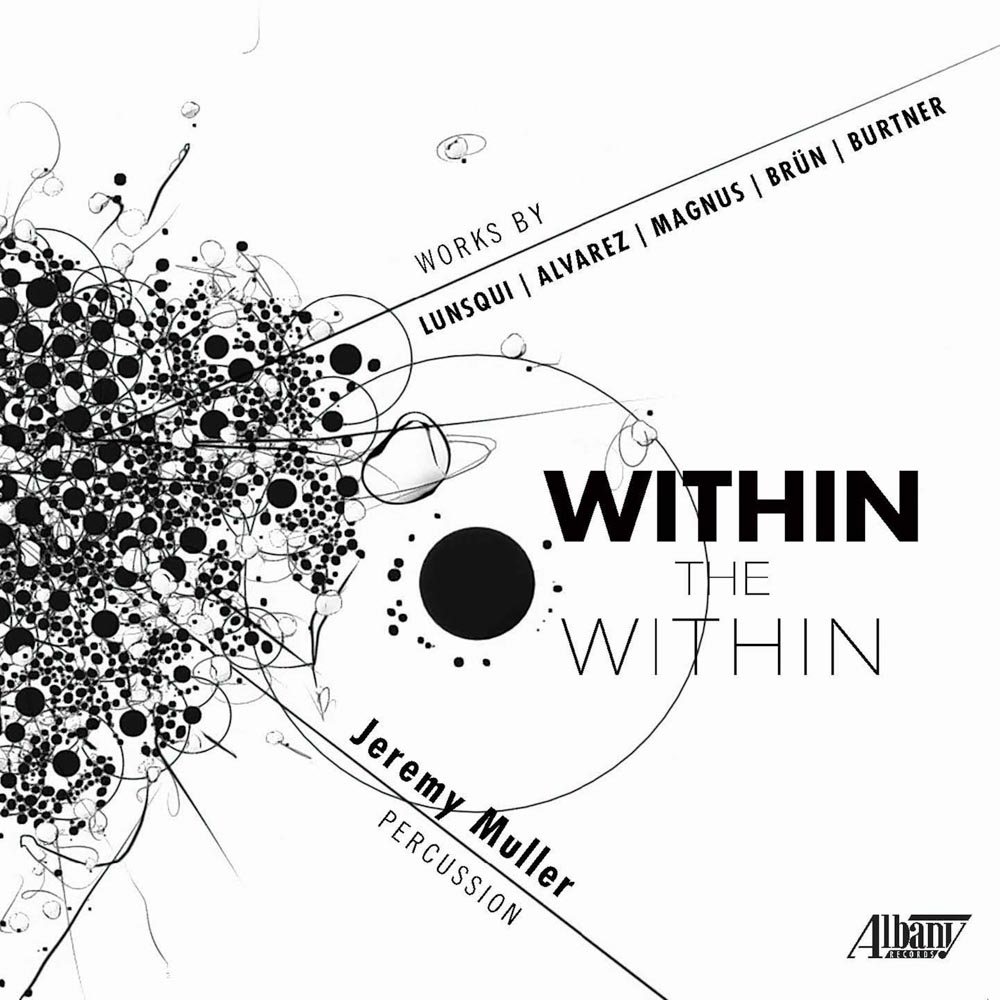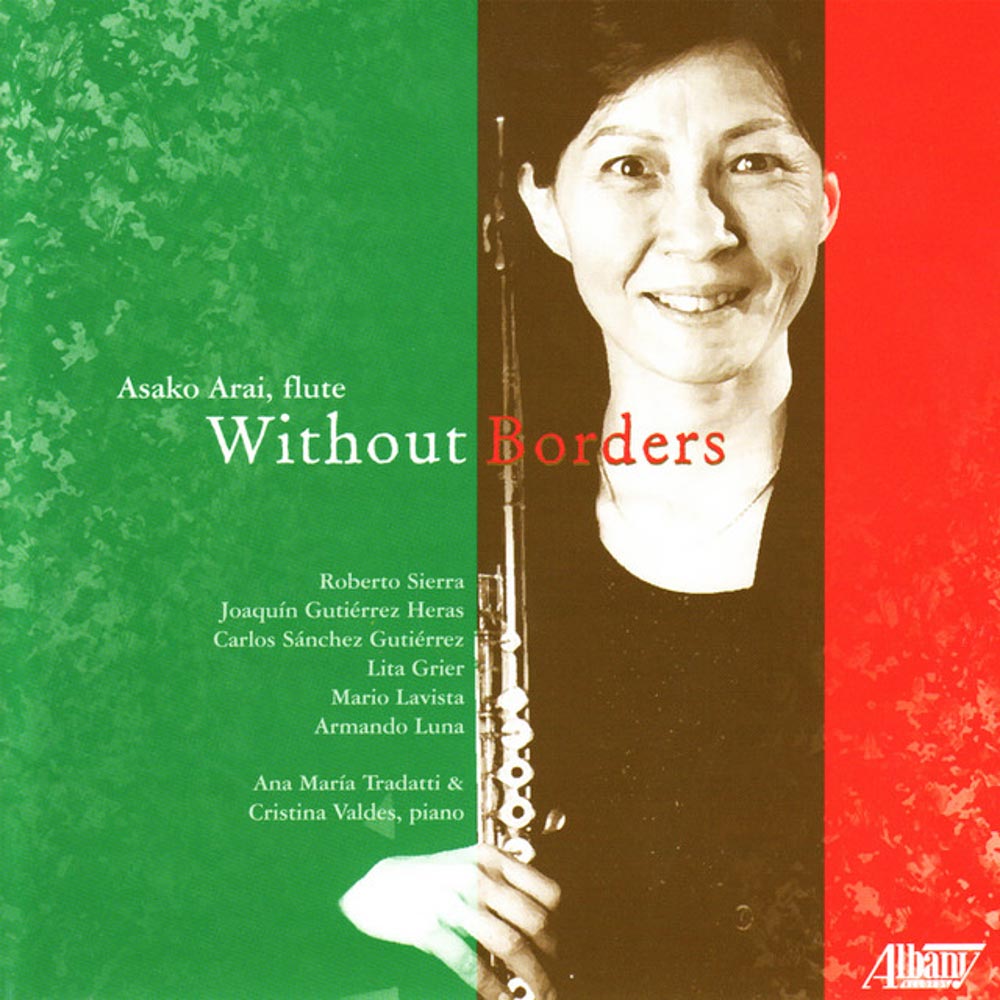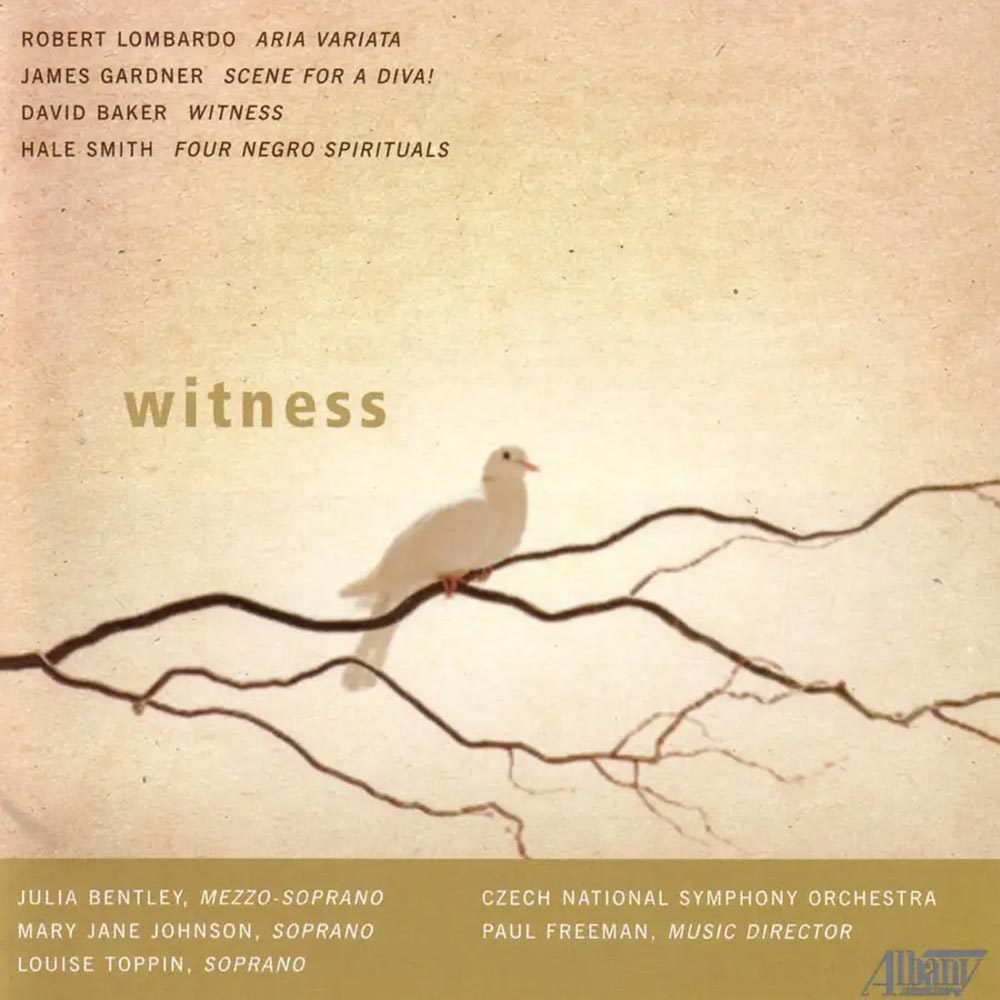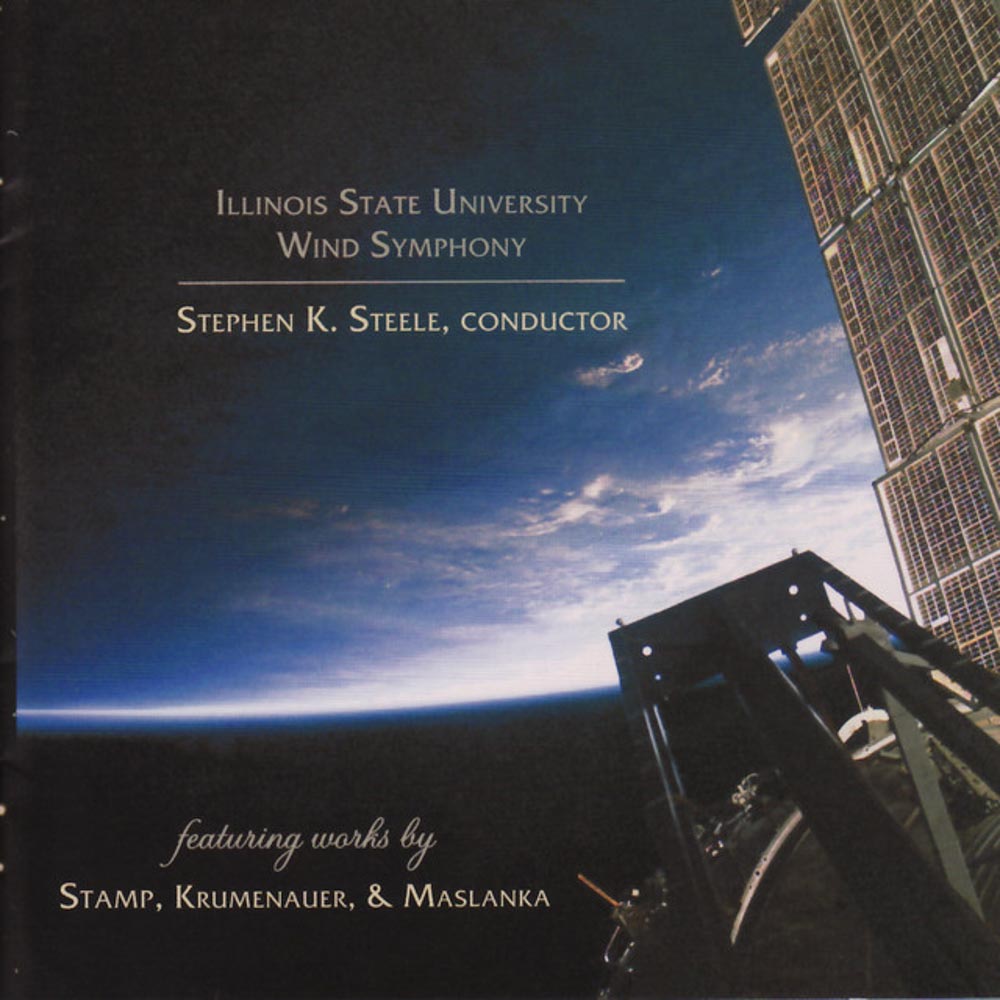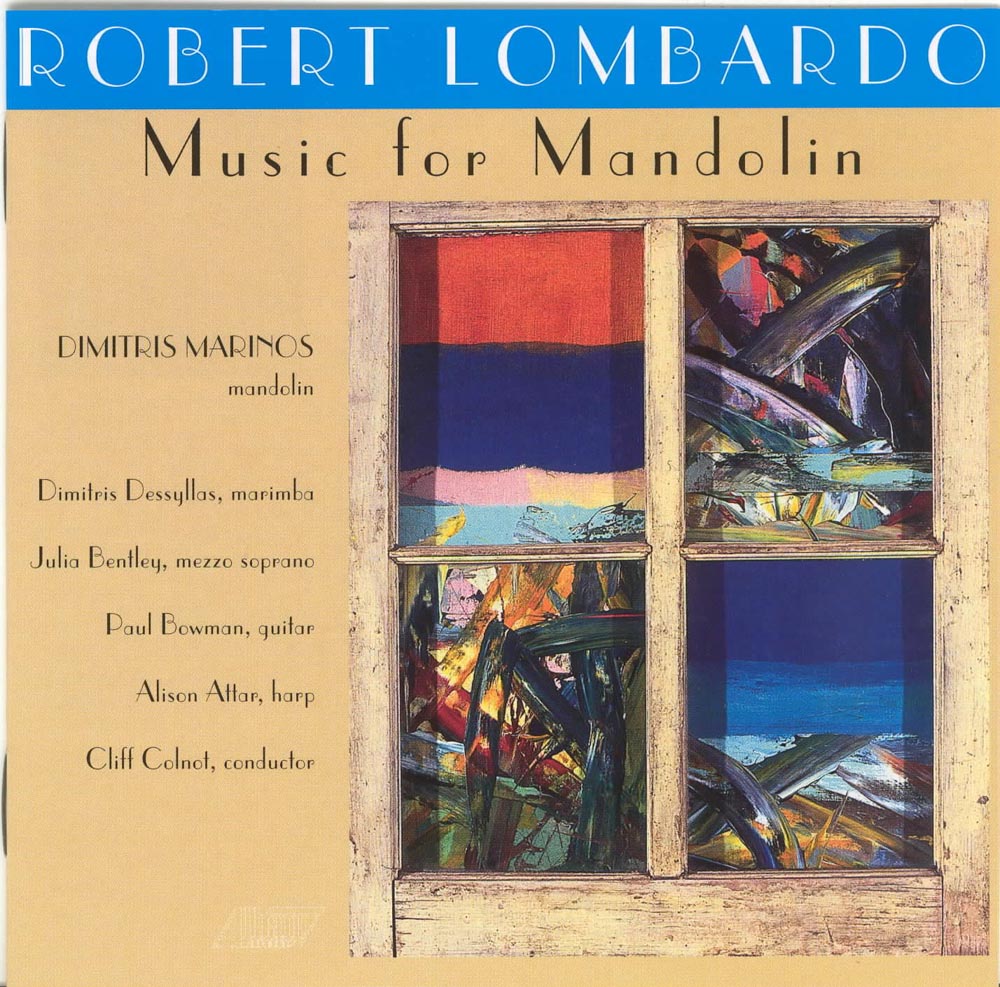Catalog #: TROY0246
Release Date: August 1, 1997ChamberThe Manhattan Wind Quintet was founded in 1985, while several of its members were earning degrees at the Manhattan School of Music in New York City and playing in the prestigious National Orchestral Association. From the beginning, the ensemble has been active in advancing the cause of new music for winds. It is not surprising then, that this, their first recording, is a collection of contemporary works composed by young Americans with whom they have collaborated over the years. Judith Zaimont composed When Angels Speak during November and December 1987, while she was flat on her back recovering from a broken leg. It is an 11 minute work, in one movement with four large sections. From the beginning it was conceived as an ensemble work, using the five players almost all the time, almost as a miniature band. Since 1992 she has been professor of composition at the University of Minnesota School of Music in Minneapolis. Peter Susser composed his Till Drumlin Waves in 1989. Today he is a member of the faculties of Columbia University and the School of Continuing Education at New York University. The composer Stephen Wisner wrote his Nocturne for Wind Quintet in August 1993 in honor of his mother who had recently died. "My objective was to commemorate my mother with an enjoyable and romantic piece, they type she would have enjoyed. The music of mine that she liked best involved uncomplicated key signatures and pretty melodies. I have incorporated one of her favorite melodies into this Nocturne: the "Children's Prayer" from Humperdinck's Hansel and Gretel." Wisner studied at the University of Michigan with Leslie Bassett and William Bolcom. He is a professional bassoonist. David Maslanka's Quintet No. 2 for Winds was commissioned by the Manhattan Wind Quintet, which gave the work its first performance in 1987 at the Weill Recital Hall in Carnegie Hall in New York City. It has three movements. David Maslanka currently lives and composes on a ranch in Missoula, Montana.
Catalog #: TROY0725
Release Date: February 1, 2005ChamberLewis Spratlan, winner of the Pulitzer Prize in 2000, was born in Miami. His music is performed regularly throughout the United States. A number of works have toured widely, as far afield as Russia and Armenia. Spratlan's work has been supported by fellowships from the Guggenheim and Massachusetts Artists Foundations, the NEA, Tanglewood and the MacDowell Colony. His opera Life is a Dream won a top prize in the Rockefeller Foundation-New England Conservatory Opera Competition and appeared on the New York City Opera's "Showcasing American Opera" series in 2002; his Apollo and Daphne Variations won the New England Composers Orchestra Competition. Among recent works is the one-act opera Earthrise, on a libretto by Constance Congdon, which was commissioned by the San Francisco Opera; a piano quartet commissioned by the Ravinia Festival; and Sojourner for ten players, commissioned for Dinosaur Annex Music Ensemble by the Koussevitzky Music Foundation at the Library of Congress. Since 1970, he has been on the music faculty of Amherst College and has also taught and conducted at Penn State, Tanglewood and the Yale Summer School of Music. It is a great pleasure to welcome this distinguished composer to the Albany Records catalog.
Catalog #: TROY1895
Release Date: April 1, 2022VocalBorn in 1895, American composer Ernest Charles became known to the public through one of his early songs that was popularized by Metropolitan Opera superstar John Charles Thomas and other songs followed that were found on voice recitals of singers like Kirsten Flagstad and Eileen Farrell. Baritone Nicholas Provenzale, a present-day champion of this composer’s songs, says that they exhibit a perfect blend of accessibility and musical interest. Provenzale enjoys an active career as a recitalist, opera singer, and educator. The recipient of numerous awards and prizes, including a Metropolitan Opera National Council Auditions award, he is currently on the faculty at West Chester University. Mr. Provenzale’s collaborator on this recording is pianist Terry Klinefelter.
Catalog #: TROY0551
Release Date: November 1, 2002VocalLisa Kirchner's latest collection fits all seasons of the heart. During the very first listening one moves easily to the soul light flowing in. And you keep going back again and again finding yourself pleasantly pinned inside a wall of exquisite and beguiling sounds. Her eclectic musical background includes recordings, concerts and nightclubs, where she has performed her multi-lingual repertoire of American jazz standards and international music. Her appearances have included numerous New York City nightclubs, among them Birdland, Maxim's, The Copacabana, The Village Gate and Tatou. When Lights Are Low is Lisa Kirchner's second album on Albany Records and follows One More Rhyme (TROY409) which garnered high praise from critics.
Catalog #: TROY0932
Release Date: June 1, 2007ChamberFetherolf's music has been premiered throughout the Americas and Europe. He writes, "I have a special love for the cello; I started life as a cellist. My first large orchestral work was a Concerto for Cello and Orchestra." His affinity for string instruments is beautifully demonstrated by the renowned members of the Gamavilla Quartet of Moravia.
Catalog #: TROY0676
Release Date: June 1, 2004ChoralYou might still hear Yiddish songs today, in concert or at social gatherings of Yiddish speakers. But their natural venue was the village or shtetl of Eastern Europe or America where you could hear them through open windows in courtyards, or from busy people humming their way from place to place. They were born and flourished in a world that is no more. They represent the joys and sorrows, dreams and aspirations of ordinary folk, the Jewish mother's dreams for her child, the poverty of the rebbe, the Jewish teacher, the freshness of young love and revolution, the joy of Jewish holidays which provided a welcome respite from the drudgery and hardships of daily life for Eastern European Jewery. Yiddish song reflects the richness of Jewish folklore, as old, vast and varied as the numerous regions which the thousand-year-old language and culture inhabited. It reached its greatest artistic expression in the latter half of the 19th century and the first half of the 20th. There are songs of work, love and lullabies; songs about great Jewish heroes and parodies about the same, songs about Hassidic rabbis, pogroms, the Messiah, the longing for redemption and the return to Zion, and of revolution. Political parodies abounded in the 20th century as did Yiddish theater songs in various genres: operetta, art song and Vaudeville. There were writers, poets and musicians throughout the ages who created this treasure trove, much of it still waiting to be culled. The Yiddish street singer was a common sight in the cities and towns of Eastern Europe, well into the 20th century. The broder zinger from Galicia heralded in an age of Yiddish folksong creativity that reached every continent on which Jews lived in the 19th and 20th centuries. The poet Itzik Manger and, of course, Mordechai Gibertig, the most famous and popular of the Yiddish folk-poets, were heirs of that tradition. Gibertig "S'Brent," a vision of burning cities and a call to arms, written in 1938, proved to be all too prophetic. During World War II, hundreds of thousands of Jews were confined in ghettos across German occupied Eastern Europe. In the ghettos and even concentration camps, members of the terrorized Jewish population engaged in remarkable, organized acts of defiance. Determined to leave a record of their history for posterity, they secretly created archives, diaries, drawings, photographs and songs to document Nazi crimes against their communities. During the same period many European Jews defied their Nazi oppressors by actively taking part in an underground war of resistance. This partisan warfare, carried out by clandestine, irregular forces operating inside enemy territory, was particularly widespread in the dense forests and nearly impassable marshlands of Eastern Europe. In 1942, the Supreme Partisan Headquarters in the Soviet Union extended its authority over the majority of partisan units in Eastern Europe and young Jewish fighters who escaped the ghettos joined the Russian partisans. Jewish partisan units were established in 1943, and the Yiddish language was now used for military communication, as well as for cultural and folkloric expression, such as poetry and song. This is a delightful album, full of energy and wit. The singing is magnificent and infectious. The CD booklet contains full texts of each song in English.
Catalog #: TROY0757
Release Date: May 1, 2005InstrumentalFrom the Hollywood Bowl to the National Cowboy Hall of Fame, from Carnegie Hall to the "Meet in Beijing" International Arts Festival, Edward Knight's music has found a home straddling the worlds of jazz, concert and theater. Born in Ann Arbor, he earned his DMA from University of Texas at Austin. He studied privately with John Corigliano and was the first American to win the Sir Arthur Bliss Memorial award, for outstanding postgraduate composer at London's Royal College of Music. Knight is a "fresh, original voice" with "an inventive sense of humor" (Bernard Holland, The New York Times) who creates music that is "visceral in its excitement" (John von Rheim, Chicago Tribune). Wayne Lee Gay of Knight-Ridder News Service calls Knight's music "inventive and melodic." Timothy Mangan of the Los Angeles Times cites "the composer's canny combination of steady meter with atonal lyricism, a waltz-like lilt with expressionist angst." Mangan notes that Knight's orchestral work is "tightly unified, suave and sinister, confidently orchestrated." Recent awards include Best Song Cycle in the American Art Song Competition sponsored by the San Francisco Song Festival; ASCAP's Rudolf Nissim Award; first prize in the National Orchestra Association's New Music Orchestral Project and fellowships to Yaddo and MacDowell.
Catalog #: TROY1441
Release Date: October 1, 2013Weakness, an opera by Barbara White, is based on an old Celtic story known as "The Curse of Macha." White was inspired to use this story for an opera after spending time in a Chicago monastery, where she participated in a seminar taught by Tom Cowan on Druid Wisdom Tales. Cowan, an internationally respected teacher of shamanism and Celtic spirituality was in turn, inspired by White's opera, where the story of Macha came alive for him, to write his own tale, which is presented on this disc. Barbara White has become increasingly active in theatrical performance and as a videomaker and she remains an idiosyncratic and searching clarinetist. She is a professor of music at Princeton University and has received awards and honors from the American Academy of Arts and Letters, the Koussevitzky Foundation, and the Radcliffe Institute for Advanced Study, among others.
Catalog #: TROY0675
Release Date: June 1, 2004InstrumentalBeth Wiemann was raised in Burlington, Vermont and studied composition and clarinet at Oberlin and Princeton University. She teaches composition and clarinet at the University of Maine, and splits her time between Maine and Massachusetts, where her husband, composer David Rakowski, teaches at Brandeis University. On this compilation of works for voice, clarinet, piano and electronics, Beth Wiemann brings together in compelling fashion three important facets of her life as a composer: a fascination with setting words, broad experience as an active performer of her own music and that of her colleagues, and an ongoing interest in the incorporation into her work of electronic and digital technology. Wiemann has been fascinated for years with the already heightened speech of poetry and its translation into the still more heightened speech of song. Among her earliest musical memories is that of hearing original cast recordings of Broadway musicals played in her home as a child. Unlike a number of composers of her generation, the Broadway idiom has exerted a far greater influence on her than later pop and rock styles, though not in an immediately obvious way. While genuinely admiring the craftsmanship of such composers for the stage as Gershwin, Kern, Porter, Rodgers, Bernstein and Sondheim, however, she has not sought to introduce superficial characteristics of their styles into her music in any literal sense. Instead, she has cultivated a harmonically subtle, more chromatic and less obviously tonally grounded pitch language. Her clearest connection with mid-twentieth century American musical theater is in her treatment of the declamation of the text. Consequently, from the songs recorded here to her recent opera, Deeds, her vocal compositions, like the best American popular songs, reflect a penchant for capturing the rhythms and nuances of vernacular speech. In keeping with that tendency, she is often drawn to poetry that is intimate and conversational in tone or concerned with aspects of everyday life. In travels to artists' colonies over the years she has had the good fortune to meet and befriend a number of poets, who often provide her with new material for musical setting. Most of this disc consists of selections from Weimann's collection Simple Songs, a project she began in 1990. Included are the first songs of the set, "No Moon, No Star" and "Night Thought." At the time of their composition, she was also engaged in setting them for women's chorus. She was prompted to make solo settings partly in response to a request from the soprano Karol Bennett for some songs to perform on a concert planned for the fall of 1990. Over time, Wiemann added other songs to the collection as she came across poetry that interested her. The latest song from the collection that appears on this disc is "Seamstress" composed in 2001.
Catalog #: TROY1547
Release Date: February 1, 2015ChamberComposer by character and performer by temperament, James Scott Balentine brings a complex mix of multicultural and eclectic experiences to his music. Professor of Music at the University of Texas at San Antonio, Balentine has received awards, grants and commissions from the Barlow Endowment, the Opera Guild of San Antonio, and many chamber ensembles and soloists. For this recording, clarinetist Robert Walzel has assembled works for clarinet and piano; clarinet and bassoon; and clarinet ensemble. Most of these works have received performances at the annual ClarinetFest conferences that take place around the world. Performer Robert Walzel has been featured at music festivals and other venues around the world for more than 25 years and was principal clarinet of the Lubbock Symphony Orchestra before becoming Dean of the School of Music at the University of Kansas.
Catalog #: TROY1398
Release Date: January 1, 2013InstrumentalThis recording fulfills a long-time dream of Charles Tibbetts to make the music of Alec Wilder for French horn more widely available. Tibbetts first met Alec Wilder and became acquainted with his music through his French horn teacher, the great John Barrows. In fact, some of the works on this recording were written for Barrows and Charles Tibbetts gave the world premiere performance of Suite Nr. 2 while a student of Barrows at the University of Wisconsin-Madison. Charles Tibbetts studied with John Barrows until his death in 1974 and then left school to pursue a 46-year career in Europe where he played with the Philharmonia Hungarica, the Badische Staatstheater Nationaltheater Mannheim and the SWR Radio Orchestras. He returned to the U.S. in 2010 and is now active as a chamber musician in the Eau Claire area of Wisconsin.
Catalog #: TROY1163
Release Date: January 1, 2010InstrumentalWilliam Appling, who died in 2008, felt that the music of Joplin and Bach were perfect compliments to each other. He was passionate to have people hear that the two composers were comparable in the caliber of their work. Bach wrote tightly structured works within the baroque style and his music became more complex over time. Joplin worked the tightly structured rag style, developing and expanding it throughout his career. Both stylistically created music having melodies within melodies. These were two geniuses writing at the highest level and thus the idea for a recording pairing the music of both was born. Those people who heard William Appling play knew that his gifts as a pianist were equal to those as a conductor, teacher and mentor. This recording is a small sample of his genius.
Catalog #: TROY0218
Release Date: January 1, 1997ChamberWilliam Kraft was appointed to the Dorothy and Sherrill C. Corwin Chair in Music Composition at the University of California at Santa Barbara in September, 1991, in recognition of his long and distinguished career as a composer, conductor and teacher. He served as percussionist and timpanist with the Los Angeles Philharmonic from 1955-1981 and he was the Orchestra's first composer-in-residence. He also served as regular guest conductor and was assistant conductor for three seasons. His music has been performed by every major American Orchestra and he has won numerous awards. Established in 1969 by music director Richard Pittman, the Boston Musica Viva is one of the oldest, most distinguished new music ensembles in the United States. With rare exceptions, a new work is premiered at each one of their concerts, usually from an American composer. Jane Manning has long been established internationally as a leading exponent of contemporary music, with more than 300 premieres to her credit. Her extensive discography includes works by Messiaen, Schoenberg and Ligeti, with conductors such as Boulez and Rattle. It is a pleasure for Albany Records to bring you such a distinguished group of performers giving us Mr. Kraft's music. All the works recorded here are world premieres.
Catalog #: TROY1280
Release Date: July 1, 2011The four compositions on this disc effectively portray both sides of William Schuman's musical personality -- from the spirited energy of American Festival Overture and the uninhibited patriotic fervor of A Free Song to the much darker character of Prelude and the profoundly moving On Freedom's Ground. One of the 20th century America's most important composers and arts administrators, William Schuman (1910-1992) went from being a Tin Pan Alley song plugger to professor at Sarah Lawrence to president of Juilliard and finally, to president of Lincoln Center. With the exception of the oft-recorded American Festival Overture, these are world premiere recordings and represent the many sides of this extraordinarily creative musical mind. Joseph Polisi, the current president of Juilliard and author of American Muse: The Life and Times of William Schuman has provided the notes.
Catalog #: TROY0566
Release Date: March 1, 2003OrchestralThose of you who know your English composers; yes, indeed, it is John McCabe who is the piano soloist in the Schuman Piano Concerto. In fact, it was John who recommended that the Orchestra perform the piece in the first place. In the new SACD format, this is a great demonstration disc to show just how good the modern orchestra can sound. Here, Credendum appears for the first time ever in stereo in any format. It is one of the loudest pieces of music ever written. The work takes its name from the Latin for "that which must be believed." It was commissioned through the Department of State (the first time a government agency had ever commissioned a piece of music) to honor UNESCO, the United Nations organization in charge of coordinating arts, science and education programs worldwide. It was premiered by the Cincinnati Symphony Orchestra, Thor Johnson conducting, on November 4, 1955, in a special concert honoring the Fifth National Conference of the United States National Commission for UNESCO. The Concerto for Piano and Orchestra was originally derived from an unperformed concerto fashioned in 1938-39 and was called Concerto for Piano and Small Orchestra. It exists in an altogether other universe from the sweeping concertos of Brahms, Grieg and Tchaikovsky. Which may clarify why one disgruntled listener, in Manhattan's Town Hall on January 13, 1943, demanded that Daniel Saidenberg - who had just led the Saidenberg Little Symphony and pianist Rosalyn Tureck in the premiere performance - explain himself. "You conduct modern music," the young woman said. "Why?" William Schuman considered himself first and foremost a symphonist, and his Fourth Symphony dates from his period of greatest industry in that form, during and shortly after World War Two. (To his regret, physical disabilities disqualified him from military service). The Third arrived in late 1941, the Fourth a few months later, the Symphony for Strings (No. 5) in late 1942 and the masterful Sixth in 1948. Aaron Copland heard a performance of this symphony in the early 80s at Tanglewood and phoned Schuman to rave about the piece, calling it "wonderful" and claiming to have been wholly unfamiliar with it. On the contrary - Schuman reminded him - not only had Copland already read through the score but Schuman had even revised the end of the second movement based on the senior composer's comments. But then, that had been four decades prior: the symphony was premiered by the Cleveland Orchestra under Artur Rodzinski (to whom it was dedicated) on January 22, 1942 - a few scant weeks after the attack on Pearl Harbor.
Catalog #: TROY0799
Release Date: December 1, 2005OrchestralAs we pointed out in our previous release of Wallace's orchestral music (TROY557), he is no relation to the Scottish composer of the same name who lived from 1860-1940. He is definitely a modern composer with roots in traditional Romanticism but with contemporary elements that give his music a fresh sound. His principal teachers were Utah's Leroy Robertson, Egon Wellesz and Edmund Rubbra. The last is the composer Wallace most resembles; the Concerto Variations is a work of grand stature, similar in scope to the British master's earlier Symphonies. In contrast is the delightful Second Dance Suite and Cantilena, which reveal Wallace's affinity for Baroque forms. The Viola Concerto is a concise, lightly-scored work which certainly makes a welcome contribution to the still-small repertoire of modern works for the instrument. This will have great appeal for listeners who enjoy neo-Romantic music.
Catalog #: TROY0573
Release Date: March 1, 2003ChamberRichard Wilson is the composer of some eighty works in many genres, including opera. A Phi Beta Kappa graduate of Harvard, Mr. Wilson holds the Mary Conover Mellon Chair in Music at Vassar; he is also Composer-in-Residence with the American Symphony Orchestra for which he gives pre-concert talks. He has been a member of the program committee of the Bard Music Festival since its inception. His String Quartet No. 3 was commissioned for the Muir String Quartet by the Walter W. Naumburg Foundation. The Muir gave the first performances at Yale and Vassar in April, 1983 and recorded the work for CRI. In July, 1984, the Delme Quartet gave the London premiere in Wigmore Hall. The String Quartet No. 4 was commissioned for the Chicago String Quartet by the Prince Charitable Trusts and the Chicago Chamber Musicians. The world premiere of the four-movement version took place at the 92nd Street Y, New York City, on January 17, 1998. The five-movement version (the version presented here) was premiered at Vassar College on February 17, 2001. In both instances, The Chicago String Quartet performed. Canzona for Horn and String Quartet was written in 2001 in memory of Luise Vosgerchian, who died in March, 2000. The composer writes: "Ms. Vosgerchian taught music at Harvard for thirty-one years beginning in 1959, the year I became a student there. A charismatic performer, lecturer and mentor, she was an inspiration to hundreds of young musicians at Harvard, Tanglewood and in the Boston area." The work received its first performance at Vassar College on February 8, 2002, by the same performers who have recorded it here.
Catalog #: TROY0503
Release Date: August 1, 2002Wind EnsembleProfessor of Music and instructor of music theory and composition at the University of Massachusetts, Robert Stern was educated at Eastman and the University of California at Los Angeles. His Ultima Fantasia was composed for the forces who have recorded it here. It reflects the composer's long standing interest in the 14th century Italian madrigal "O tu cara scienzia mia musica" by Florentia which began in 1968 with a series of works based on this madrigal. Joseph Turrin received his formal education at Eastman and the Manhattan School of Music. His Serenade Romantic was composed in the summer of 1982 for the New Jersey Wind Ensemble. The work is dedicated to the memory of Howard Hanson and is intended to be a cinematic tribute to this fine composer. Michael Daugherty writes about Motown Metal : "Motown Metal is a seven-minute composition for brass and percussion inspired by the rhythms of industrial Detroit: city of automobile clamor, the sixties Motown sounds and the nineties techno beat. It features only instruments made of metal and was premiered in February 1994 by the Detroit Chamber Winds under H. Robert Reynolds. David Maslanka's Morning Star was commissioned by the Grand Ledge, Michigan, High School Wind Symphony, Michael Kaufmann, conductor. "I was asked to write a celebratory piece for the opening of the wonderful new concert hall at Grand Ledge High. When it came time to compose, I took up a little tune that came to mind. The result is a happy piece, a concept which does not usually attach itself to my music." Maslanka's Symphony No. 4 was commissioned by a consortium of collegiate wind bands and premiered by the University of Texas at Austin Wind Ensemble during the Texas Music Educators' Convention in 1994. The backbone of the work is the weaving together of several hymn tunes. "The spontaneous rise of the impulse to shout for the joy of life" is how Maslanka describes this piece.
Catalog #: TROY1803
Release Date: February 1, 2020Wind EnsembleThe Atlanta Chamber Winds is the premiere ensemble of its type in the Southeastern United States. Founded by Robert J. Ambrose in 2006, the group comprises many of the finest professional wind players in Atlanta. The ensemble is committed to promoting and recording lesser-known works for the chamber wind medium, as demonstrated by this recording of 20th and 21st century works by composers Robert Spittal, Leslie Bassett, Tim Jansa, Esther W. Ballou, Daniel Pinkham, and Ezra Laderman. The compositions range from an octet for winds to a double woodwind quintet, to a wind sextet and a wind trio.
Catalog #: TROY0797
Release Date: October 1, 2005InstrumentalIn a very short period, Buenos Aires-born Jorge Liderman has achieved much success both on and off record. He studied in Israel under Mark Kopitman and under Ralph Shapey and Shulamit Ran in Chicago. His works have been commissioned and performed by the London Sinfonietta, the American Composers Orchestra, the Los Angeles Philharmonic and many other organizations here and abroad. As he writes about these fascinating works, "I have particularly been concerned with the idea of repetition since the early 1990's, especially after the impact minimalism has had not only on my musical thinking, but also on the musical world as a whole...I have used various types of repetition to create a cohesive structure on which to base some of my works...the three works in this album were written between 1990 and 2003; in different ways they all show the use of repetition as a central element..." Here is music that combines the color of Ginastera with the rhythmic sense of Steve Reich.
Catalog #: TROY1172
Release Date: February 1, 2010InstrumentalPianist and composer Yvar Mikhashoff had an international performing career that led him to promote new music and American music around the world. He organized many festivals and broadcasts throughout the world, notably at the Almeida Theater in London and De Ijsbreker in Amsterdam. Mikhashoff was one of the founders of the North American New Music Festival in Buffalo and its co-director, with Jan Williams, for 11 years. The Canadian pianist Winston Choi offers splendid performances of Mikhashoff's Elemental Figures and Ravel's Gaspard. The parallel design of Ravel's work and Mikhashoff's is multi-faceted and extensive. Both are trilogies that are associated with poetry and the tempos and the structure of both works are similar.
Catalog #: TROY0670
Release Date: June 1, 2004InstrumentalChris Gekker is Professor of Trumpet at the University of Maryland. As a soloist he has been featured at Carnegie Hall, Lincoln Center, and throughout the United States, Asia, and Europe. For 18 years Chris was a member of the American Brass Quintet. He was principal trumpet of the Orchestra of St. Luke's and frequently performed and recorded as principal of the Orpheus Chamber Orchestra. He writes: "Eric Ewazen, David Snow, and I all entered the Eastman School of Music as freshmen in 1972, and in fact David and I were roommates that first year. We all became friends quickly, and I frequently prepared and performed their music during those student years. In the more than 30 years since then, rarely has a year gone by that I have not been involved in their works, and in some years there have been many performances. When I joined the American Brass Quintet in 1981, it was with great pleasure that I introduced pieces by David and Eric to the group, works that immediately became standards on the Quintet's recital programs and recordings. As far as our friendships have gone, well, some things do get better with age, and it is with a deep sense of gratitude that I look back upon all our years as colleagues. Both Eric and David write music that is important to me, music that I hear when I am away from my instrument, music that continues to challenge me to strive for improvement as a musician and trumpet player". David Snow holds degrees in music from Eastman and Yale University. He studied with Joseph Schwantner, Warren Benson, Samuel Adler, and Jacob Druckman. Eric Ewazen was born in 1954 in Cleveland, Ohio. He studied at Eastman and Juilliard. He has been Vice-President of the League-ISCM, Composer-in-Residence with the St. Luke's Chamber Ensemble. Lecturer for the New York Philharmonic's Musical Encounters Series, and he has been on the faculty of the Juilliard School since 1980.
Catalog #: TROY1969
Release Date: February 15, 2024OrchestralHarmony in Black is part of a five-year initiative by the Wisconsin Chamber Orchestra that aims to elevate the voices of an array of living, diverse composers throughout the United States. For this first recording composers Patrice Rushen and William Banfield are featured. Their three compositions do not quote spiritual melodies directly but do embody the spirit of those songs by drawing either on direct quotation of speeches or writings. Multi-Grammy nominated artist Patrice Rushen is admired by many for her groundbreaking achievements including serving as Musical Director for the 46th-48th Annual Grammy Awards. Dr. William Banfield has produced a body of work in the past 25 years that includes music, books, teaching and creative work that contributes to contemporary arts leadership. Banfield is an award-winning composer who is now serving as Composer-in-Residence of the Wisconsin Chamber Orchestra.
Catalog #: TROY1877
Release Date: October 1, 2021PercussionThe innovative Jeremy Muller is active as a percussionist, composer, and multimedia artists. He has performed as a featured soloist at many venues throughout the United States, Canada, and Australia and given world premieres of works by many composers including some included on this recording. Alexandre Lunsqui's Materiali includes layering of pulses and velocities generated from the exploration of materials such as clay, wood, metal, plastic, water, and air. Javier Alvarez's Temazcal is an early example of electroacoustic music. Cristyn Magnus; Pitch vs. Computer is a work that treats video games as scores, while Herbert Brün's Stalks and Trees and Drops and Clouds are very early computer work and one of the earliest conceived for a solo percussionist. Matthew Burtner's Glisten of Places is a composition and a collection method for living in the world through sound.
Catalog #: TROY1118
Release Date: May 1, 2009VocalLori Laitman, one of America's most prolific and widely performed composers of art song comments: "The songs on this CD are for solo voice and piano, and all have been composed since 2000, making them 21st century art song. The poems were written between 1612 and 2008...My goal is to create dramatic music to express and magnify the meaning of the poem...Each song becomes my musical interpretation of the poem."
Catalog #: TROY1101
Release Date: March 1, 2009InstrumentalThe origin of this project lies in a grant obtained by flutist Asako Arai for commissioning and performing four new works. After the pieces were performed, Arai conceived the idea of making a recording and presenting a wide panorama of music for flute from both sides of the border. Moreover, there are no strict borders as far as musical languages and chronology are concerned with the six works. Not only is there a time frame of almost half a century between the earliest and the latest of these pieces, but there is also a wide spectrum of technical and expressive means.
Catalog #: TROY0868
Release Date: September 1, 2006OrchestralThe versatile and enterprising Paul Freeman, Julia Bentley, Mary Jane Johnson and Louise Toppin here introduce four works for soprano voice and orchestra, pieces which are thoroughly modern yet continue the grand tradition of the concert aria. Robert Lombardo received his master’s degree in composition from the Hartt School of Music. Aria Variata was commissioned by the Chicago String Ensemble and its director, Alan Heatherington. A native of Texas, James Gardner studied under Anshel Brusilow and Peter Herman Adler. Scene for a Diva expressly pays homage to the kind of concert aria composed by Mozart, written as if it were an actual opera aria, complete with dramatic recitativo and cantabile sections. David Baker is Distinguished Professor of Music and Chairman of the Jazz Department at the Indiana University School of Music. Witness was commissioned by Philip Brunelle for the Plymouth Music Series of Minnesota’s 1990-1991 season. They represent the composer’s reverent treatment of heartfelt and timeless spiritual texts. Another distinguished African-American composer, Hale Smith grew up performing both classical and jazz music. He chose these particular Four Negro Spirituals because he was deeply moved by the zeal of the songs. As an outstanding composer and arranger he has captured the essence of these songs with his brilliant orchestration.
Catalog #: TROY1667
Release Date: April 1, 2017ChoralWomen of Valor, an oratorio, is a celebration of women from the Old Testament, inspired by a midrash (biblical commentary) on Proverbs, where each line of the biblical text from Proverbs 31 represents a strong, resourceful woman. Texts for Women of Valor are drawn both from the Bible and from modern poems and prose. Women of Valor highlights the stories of Sarah, Leah, Rachel, Jocheved, Miriam, Hannah, Jael, Michal, Ruth, and Esther. The work was premiered in 2000 by the Los Angeles Jewish Symphony conducted by Noreen Green. Composer Andrea Clearfield's music has been praised by the New York Times for its "graceful tracery and lively, rhythmically vital writing" and the Los Angeles Times for its "fluid and glistening orchestration." Her awards include a Pew Fellowship in the Arts as well as fellowships at the American Academy in Rome, the MacDowell Colony, and the Rockefeller foundation's Bellagio Center, among many others. The Los Angeles Jewish Symphony is the only orchestra outside of Israel dedicated to the performance and preservation of orchestral works of distinction that explore the Jewish experience. Founded in 1994 by Noreen Green the LAJS has presented more than 20 world premieres of works by contemporary Jewish composers.
Catalog #: TROY1534
Release Date: December 1, 2014InstrumentalA native of New Zealand, cellist Miranda Wilson has performed on five continents as a soloist and chamber musician. Educated in New Zealand, England and the U.S., she is on the faculty of the University of Idaho and is artistic co-director of the Idaho Bach Festival. Wilson has chosen to combine Ernest Bloch's three suites for solo cello with two new works by Daniel Bukvich. One of the connecting features between these two composers is their association with the Pacific Northwest. Bloch spent his last years in Oregon, while Bukvich has spent his career on the faculty at the University of Idaho. Bukvich studied Bloch's manuscripts as a student and names Bloch as one of his influences.
Catalog #: TROY0996
Release Date: January 1, 2008Wind EnsembleThis latest release in this remarkable series by the Illinois State Winds presents two major Symphonies by popular veterans of the field, Jack Stamp and David Maslanka, and introduces the music of the young American composer Kevin Krumenauer. Blue on Red explores the transition from grief and loss to life and celebration. The two colors represent a strong sense of emotion during the opening and closing movements. The renowned David Diamond was both a friend and mentor to Jack Stamp, the Professor of Music and Director of Wind Studies at the Indiana University of Pennsylvania. Diamond himself had written an Elegy in Memory of Ravel for winds in 1937, and it is fitting that Stamp created this tribute to Diamond within the context of the wind orchestra. Finally we hear one of the major works of the repertoire, David Maslanka's Symphony No. 2, as conductor Steele continues his series devoted to the music of this composer (previous releases are on TROY821, 774/75, 600 and 500)
Catalog #: TROY0611
Release Date: October 1, 2003ChamberRobert Lombardo was born in Hartford, Connecticut to Sicilian immigrants. He graduated with a master's degree in composition from the Hartt School of Music where he studied with Arnold Franchetti. He was awarded a Ph.D. in composition from the State University of Iowa. Lombardo holds the title of Professor Emeritus from Roosevelt University where he was Professor of Theory and Composition and Composer-in-residence from 1965 until 1999. The composer writes: "Although the mandolin has occasionally been used by composers in contemporary literature, e.g., Schoenberg, Stravinsky and Crumb, I always thought of the instrument in the folk category. About a dozen years ago, my perception of the use of the mandolin changed. In 1991, Dimitris Marinos, a student who recently arrived from Greece, came to my studio at Roosevelt University for his first composition lesson. He had a mandolin case tucked under his arm. After his lesson, I was curious and asked him if he wouldn't mind playing his mandolin for me. I guess I expected him to play a folk tune, and was pleasantly surprised - amazed would be a better word - when he played a very complex work replete with multiple stops, fast chromatic passages that covered the entire range of the instrument - in an apparent effortless fashion. I was captivated by this young man's musicality and virtuosity. After he showed me some of the instrument's technical capabilities, I thought about writing a short composition for him." That is the origin of how the compositions that appear on this disc came about.
Catalog #: TROY0481
Release Date: November 1, 2001OrchestralStanislaw Skrowaczewski retains a unique position on the international musical scene, where he is both a renowned conductor and a highly regarded composer, especially of large scale orchestral works. Born in Lwow, Poland but resident in the U.S. since 1960, Skrowaczewski showed great promise as a pianist, making his debut with the Beethoven Triple Concerto, but an injury to his hands during World War II terminated his keyboard aspirations. Composing and conducting became his double focus. Directly after the War - still in his mid-twenties - he was named music director of the Breslau Philharmonic, then the Katowice Philharmonic, Krakow Philharmonic and then the Warsaw National Orchestra. During this period he also studied with Nadia Boulanger in Paris. In 1958, at the invitation of George Szell, he made his American conducting debut with the Cleveland Orchestra. In 1960, he was named music director of what was to become the Minnesota Orchestra, a position he was to hold for 19 years. His Passacaglia Immaginaria was completed in 1995. It unfolds in a provocative sound world. Similar to the Passacaglia of the Baroque era, a species of continuous variations on a ground, his design is based on the principle of metamorphosis. The work was commissioned by the Minnesota Orchestral Association and Eiji Oue gave the premiere with the Orchestra on April 10, 12 and 13,1996. For its 35th anniversary season in 1993-94, the St. Paul Chamber Orchestra, requested a new work from Skrowaczewski. The resulting Chamber Concerto was premiered on November 26, 27, 1993. In January 1981, while guest conducting in Frankfurt, Germany, Skrowaczewski finished his Clarinet Concerto, which he dedicated to Joseph Longo, the co-principal clarinetist of the Minnesota Orchestra. The premiere of this work was April 15,17,18, 1981 and again the composer conducted the orchestra.
Catalog

©2024 Albany Records. All rights reserved. | Privacy Policy | Website by PARMA Creative.
